
The title sounds almost funny, doesn’t it? However, listening to the funeral-like tune and “strange,” old-fashioned words and expressions certainly won’t make you laugh.
Every time I see proud American or French people jump up and sing along when their anthem starts playing, my heart clenches. Play the Czech anthem in a room full of Czechs… Nothing will happen. Sadly, we’re not patriots––quite the opposite, actually––and it shows. Don’t get me wrong, when the Czech hockey team won the gold medal at the Olympics 20 years ago, most of us felt very… Czech. Since then… Radio silence in the patriotism department.
In this article, we will explore and decipher the lyrics and history of the Czech national anthem. According to some, it is a beautiful expression of Czech ideals: humanism and deep love for our beautiful land. Compared to the heroic French La Marseillaise or spunky Slovakian Nad Tatrou sa blýská (which used to be the second part of Czechoslovakian anthem before 1993––more on that later), it’s not much. It seems to lack energy and fire… And I can’t help but compare their presidents to our old man when I hear the slow, sort of tired-sounding tune.
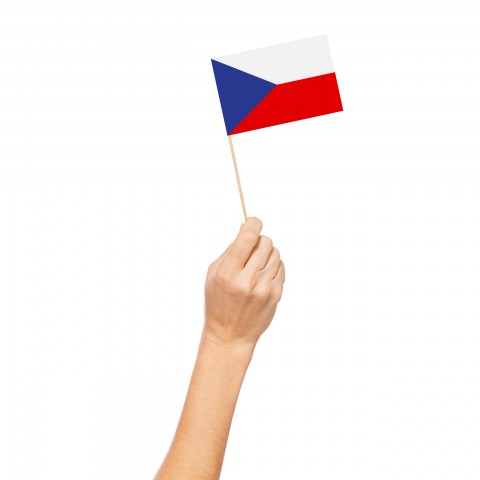
Czech flag – Česká vlajka.
 Table of Contents
Table of Contents
- The History of Czech Anthem: It Started with an Opera
- Lyrics of Kde domov můj
- When is it played?
- How CzechClass101.com Helps You Learn Czech in a Fun Way
1. The History of Czech Anthem: It Started with an Opera
Believe it or not, this piece was originally written for a patriotic opera comedy called Fidlovačka aneb Žádný hněv a žádná rvačka (“Fidlovačka, or No Anger and No Brawl”). In the play, written by Josef Kajetán Tyl and composed by František Škroup, it is performed during a very emotional, sad scene by a blind violinist. The author, Josef Kajetán Tyl, wasn’t sure about the song’s quality, and almost convinced the director to leave it out. He felt the composer’s version, as opposed to the festive chorale that he asked him to compose, was too sentimental.
Imagine his surprise when Fidlovačka became widely popular among the Czech audience who, at those dark times, striving for recognition and trying and failing to break free from the oppressive Habsburg monarchy––in 1834, people would grab every chance to be Czech, speak Czech, sing in Czech to affirm their national identity, and let the German empire know they would hold their ground no matter what.
It is hard to believe that some people found this sweet song “vulgar.”
- ➣ Czechs were only an ethnic minority, and the goal of the opera and the future anthem was to enhance the national feeling and pride.
Kde domov můj was soon accepted as an informal Czech anthem, and when Czechoslovakia, aka the First Republic, was founded in 1918, it became the first official anthem of the young country. Because of the ethnic and language diversity (it was VERY common to speak German at that time), the anthem was translated into German and Hungarian. The German version of the anthem was used between 1918 and 1938.
Fun Facts:
- The title of the play later became the name of a theater in Prague.
- The bilingual Czechoslovakian version was played in many Slovakian towns at noon before the countries split in 1993.
- Before Czechoslovakia was established, there was a long debate about whether the song was still suitable and whether there should be a more “serious” piece written for this noble purpose. Remember, opera was almost like today’s movies, and having a “movie soundtrack” as an anthem was considered almost frivolous by officials and folk.
- Here is a great example of typical Czech dark humor: “Do you know what would happen if the Jaslovské Bohunice powerplant (Slovakian nuclear powerplant) exploded? We would switch anthems: Slovaks would sing “Where My Home Is” and Czechs “Lightning over the Tatras.”
2. Lyrics of Kde domov můj
- ➣ Although the Czech anthem has two stanzas, only the first one is played at ceremonies, important official events, and sports championships.
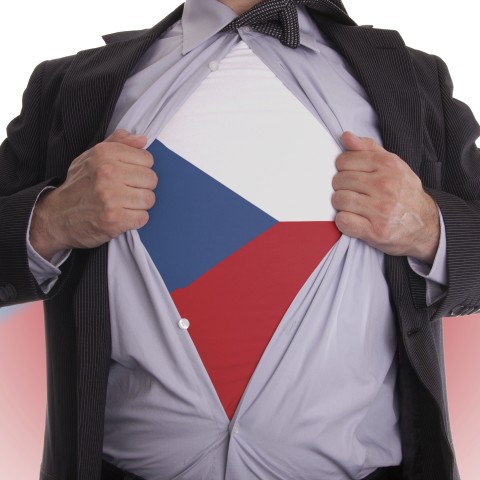
Patriot – Vlastenec.
A – Czech Anthem Lyrics and English Translation:
First verse:
Kde domov můj, kde domov můj,
“Where my home is, where my home is,”
voda hučí po lučinách,
“Streams are rushing through the meadows,”
bory šumí po skalinách,
“Midst the rocks sigh fragrant pine groves,”
v sadě skví se jara květ,
“Orchards decked in spring’s array,”
zemský ráj to na pohled!
“Scenes of paradise portray.”
A to je ta krásná země,
“And this land of wondrous beauty,”
země česká domov můj,
“Is the Czech land of my home,”
země česká domov můj!
“Is the Czech land of my home!”
Second verse:
Kde domov můj, kde domov můj,
“Where my home is, where my home is,”
v kraji znáš-li bohumilém
“If, in the heavenly land, you have met”
duše útlé v těle čilém,
“Slender souls in spry bodies,”
mysl jasnou, vznik a zdar
“Of clear mind, vigorous and prospering,”
a tu sílu vzdoru zmar,
“And with a strength that frustrates all defiance,”
to je Čechů slavné plémě
“That is the glorious nation of Czechs”
mezi Čechy domov můj!
“Among the Czechs (is) my home!”
mezi Čechy domov můj!
“Among the Czechs, my home!”
B – Czechoslovakian Anthem: 1918 – 1993
Before the countries split on the 1st of January, 1993, the first stanza and the Slovakian song Nad Tatrou sa blýská (“Lightning over the Tatras”, literally “Above Tatras it is lightning”)––written in 1844––formed the official, two-part, bilingual Czechoslovak anthem.
- ➣ Both were played and sung in their respective languages, the first, Czech part in Czech, the second, Slovakian stanza, in Slovakian.
The main theme is a storm over the Tatra mountains––a symbol of danger threatening to the Slovakian people, and their strong desire to overcome all their hardships. This patriotic song was particularly popular during the national insurgencies in 1848 – 1849.
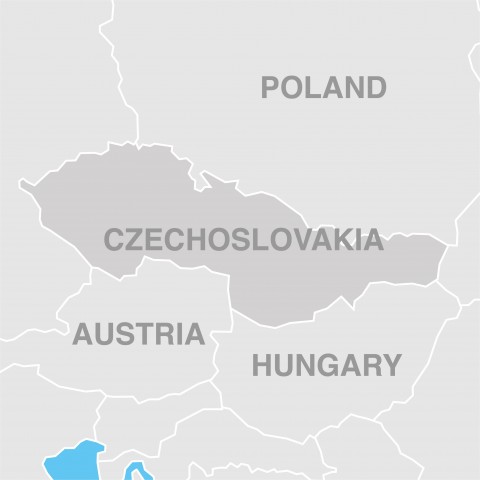
Czechoslovakia – Československo.
The Slovakian Part of Czechoslovakian Anthem:
Nad Tatrou sa blýska, hromy divo bijú
“There is lightning over the Tatras, thunders wildly beat,”
Nad Tatrou sa blýska, hromy divo bijú
“There is lightning over the Tatras, thunders wildly beat.”
Zastavme ich, bratia, veď sa ony stratia,
“Let’s stop them, brethren, after all they’ll disappear,”
Slováci ožijú.
“the Slovaks will revive.”
Zastavme ich, bratia, veď sa ony stratia,
“Let’s stop them, brethren, after all they’ll disappear,”
Slováci ožijú.
“the Slovaks will revive.”
C – What Does the President Think?
Our former president Václav Klaus offers his opinion: “I hear it quite often––played now by a Kazakh orchestra, now by an Indian, Qatar or Israeli one. Their renderings are quite original. Recently I was in the United States, near Boston, at Brandeis University, and when I was entering the room to deliver my lecture, a jazz trio played our national anthem – an absolutely unconventional group of American jazzmen. By the way, the national anthem is a very frequent topic of my discussions with my counterparts. I often say: ‘It is interesting how slow, solemn and quiet our anthem is, compared to yours, which is youthful, striking and full of spirit.’ I approach the national anthem with great humbleness. It is a serious thing.”
The newest recording of the Czech national anthem was presented at a ceremony in the National Museum in Prague on the 28th of September 2008––the Day of Czech Statehood.
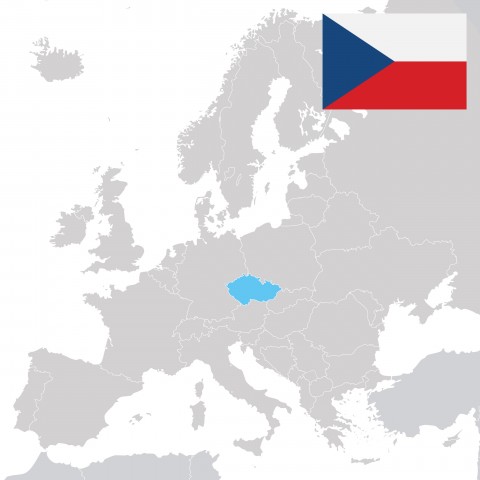
The Czech Republic has been a member of the EU since 2004.
D – Related Vocabulary
| Czech | English |
| Hymna | Anthem |
| Státní znak | State Emblem |
| Standarta prezidenta republiky | Standard of the President of the Republic |
| Státní svátek | Public holiday (or Bank holiday, you can find the list of Czech public holidays here) |
| Vlajka | Flag |
| Vlastenectví | Patriotism |
| Slavnostní ceremoniál | Festive ceremony |
| Projev prezidenta republiky | Speech by the President of the Republic |
3. When is it played?
Kde domov můj is played at important, official speeches, memorial services and ceremonies and, of course, sports events (during championships and Olympics).
- ➣ Basically, it’s played every time the Czech flag is raised, and when there’s a great victory or revolution.
Czech Anthem Videos:
Here’s a new version with beautiful scenery in the background:
This is a very emotional footage from the Velvet Revolution––end of communist era––from 1989, sung by two widely popular Czech singers. It contains the Slovakian part as well:
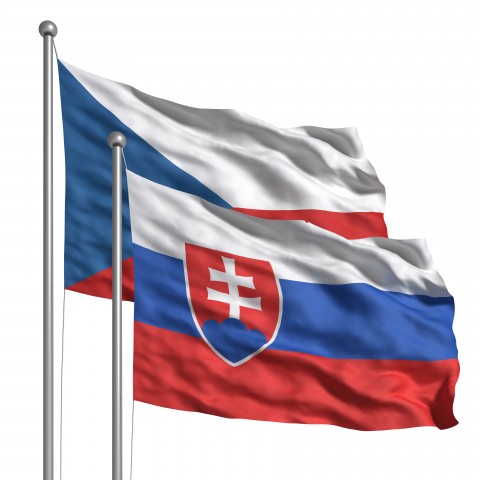
The 28th of October: Independent Czechoslovak State Day, of many Czech bank holidays.
4. How CzechClass101.com Helps You Learn Czech in a Fun Way
That’s it, guys! I hope you enjoyed this article and learned something new! In case the location words and phrases listed in this article weren’t enough for you, and you want to keep learning, please check out our Basic Bootcamp – the very basic grammar and vocab in 5 compact lessons.
If you’re taking Czech language learning seriously, and want to learn Czech fast, free and online, you might grab a Czech grammar book or learn online (which is way more convenient). Seriously, learning a new skill has never been easier. Just grab your phone and get to work!
CzechClass101.com will make learning Czech easy, exciting, and fun. With us, it’s not about endless memorizing or thick textbooks. Learn Czech the better way – with us, you’ll make progress faster than you could imagine!
What can you find here?
- English to Czech translation and pronunciation tips/tricks
- Over 630 audio and video lessons
- Vocabulary learning tools
- Spaced repetition flashcards
- Detailed PDF lesson notes
Sign up now, it’s free!
One last thing: Let us know in the comments if you like the Czech anthem, and how you feel when your country’s national anthem is playing. Share some useful tips and tricks!

Good Morning, Class: Czech Classroom Phrases

If you’re planning to study or teach in the Czech Republic, this article is just for you. You might be surprised by the subtle differences between Czech and English communication during classes––be it greetings, or how we address the teachers––I know I was.
I first started with English in 3rd grade. I was 8 years old, and learning to say all those new, funny sounds was very exciting and fun. Let me tell you, my 40-something fiancé doesn’t find it quite as exciting, and he’s constantly asking, “why do y’all say this and not that”? And I would like to address these quirky nuances in this article as well. Because no matter how funny and kind our “Mrs. Teacher” was, most of the things she taught us were just literal translations, and watching movies in English 15+ years later brought up a lot of doubt and questions that will remain unanswered. (We called the eraser “rubber.” Fun times.)
In this article, you will learn a lot of Czech words and not-so-basic Czech phrases: Czech classroom greetings and classroom vocabulary in Czech. Do you know how our school system works? No? You will find all the info here.

 Table of Contents
Table of Contents
- Good morning, Mrs. Teacher: Czech Classroom Greetings
- Czech Classroom Phrases and Questions
- What?: Czech Classroom Phrases When Asking for Clarification
- Dog Ate My Homework: Czech Classroom Phrases for Apologizing and Absence
- Classroom Vocabulary in Czech: My Favorite Subject Is…
- How CzechClass101.com Helps You Learn Czech in a Fun Way
1. Good morning, Mrs. Teacher: Czech Classroom Greetings
First things first. Younger kids (elementary and high school) do not address their teachers using their last names. Even your favorite Mrs. Dumbledore from 5th grade would be degraded to an official “Mrs. Teacher“––paní učitelka.
University professors tend to be either super formal (pan profesor and paní profesorka, pan doktor and paní doktorka––”Mr. and Mrs. Professor”, “Mr. and Mrs. Doctor”, etc.), but there might be “an exception that confirms the rule” (výjimka potvrzuje pravidlo).
- ➢ Having said that, you always address your teachers with the formal tone, vy (“You” 2nd person singular), just like in Spanish or French, for example.
- ➢ You address them pan or paní [title]––Mr. Or Mrs. [title], not their last name.
- ➢ [Male] Pan učitel/profesor (“Mr./Mrs. teacher/professor”)
- ➢ [Female] Paní učitelka/profesorka (“Mrs. teacher/professor”)
Here are a few examples:
- Paní učitelko, mám dotaz ohledně základních českých frází. – “Mrs. teacher, I have a question regarding basic Czech phrases.”
- Pane učiteli, myslíte tuto kapitolu? – “Mr. teacher, do you mean this chapter?”
- Paní profesorko, chci s vámi mluvit o mé práci. – “Mrs. professor, I would like to talk to you about my assignment.”
- Pane profesore, máte čas se mnou prodiskutovat moji bakalářskou práci? – “Mr. professor, do you have time to discuss my bachelor thesis with me?”
Most Common Czech Classroom Greetings:
- Dobré ráno /dobrý den, pane učiteli/profesore, paní učitelko/profesorko. – “Good morning, Mr. teacher/professor.”
- Uvidíme se zítra, [name]. – See you tomorrow, [student name].
- Na shledanou zítra. – “Bye until tomorrow.”
- Na shledanou. – “Bye (literally “until we meet each other again”, formal.)
- Ahoj, čau, nazdar, jak se máte? Jak to jde? Jak jste se vyspali? – “Hello, hi, hi, how are you? How is it going? How did you sleep?” (informal)
- Ahoj, máš úkol? – “Hi, do you have the homework?”
- Čau, učila ses? – “Hey, did you study?”
- Ahoj, píšeme dneska test? – “Hi, do we have a test today?” (literally, “are we writing a test today”)

For more ways to say hello in Czech, read this great article full of basic Czech phrases.
2. Czech Classroom Phrases and Questions
Here’s a list of the most common Czech classroom command phrases you might hear from your teachers. All of these example sentences are in the plural form.
- Prosím otevřete si učebnice na straně 111. – “Please open your textbook on page 111.”
- Dobře poslouchejte. – “Listen carefully.”
- Ticho, prosím. – “Silence, please.”
- Chce se někdo na něco zeptat? – “Does anyone want to ask anything?”
- Podívejte se na tabuli a přečtete tato česká slova. – “Look at the board and read these Czech words.”
- Otevřete si knihy. – “Open your books.”
- Zavřete knihy. – Close your books.
- Opakujte po mně, prosím. – “Repeat after me, please.”
- Přihlaste se/Zvedněte ruku. – “Raise your hand.”
- Budete pracovat ve dvojicích. – “You will work in pairs.”
- Vstaňte, prosím. Posaďte se, prosím. – “Stand up please. Sit down, please.”
- Teď prosím podtrhněte správná slova a přeškrtněte nesprávná. – “Underline the word and cross out the wrong ones.”
- Vypněte telefony, prosím. – “Turn off your phones, please.”
- Máte 15 minut. – “You have 15 minutes.”
- Jak se hláskuje tohle slovo? – “How do you spell this word?”
- Jak se tohle řekne česky? – “How do you say this in Czech?”
- Napadá vás nějaký příklad? – “Can you think of an example?”
- Rozumíte všemu? – “Do you understand all of this?”
- Je to všem jasné? – “Is it clear to everyone?” (as in, “does everyone understand?”)
- Chce se někdo na něco zeptat? – “Does anyone want to ask anything?”
- Potřebuje někdo pomoc s tímhle cvičením? – “Does anyone need help with this exercise?”
That’s a Cool Pencil: Talking about School Supplies in Czech
Did you know it is very common to keep all your textbooks at home and bring them to school every single day? Lockers aren’t as big as in the US here, and Czech students carry heavy bags of books around.
If needed, you will ask your classmates:
- Můžu si půjčit [supply]? – “May I borrow your/a [supply]?”
- Půjčíš mi [supply], prosím? – “Would you lend me [supply], please?”
- Ztratil/a jsem [supply]. – “I lost my [supply].”
- Nebudeš mít vždycky v kapse kalkulačku! – “You won’t always have a calculator in your pocket.”
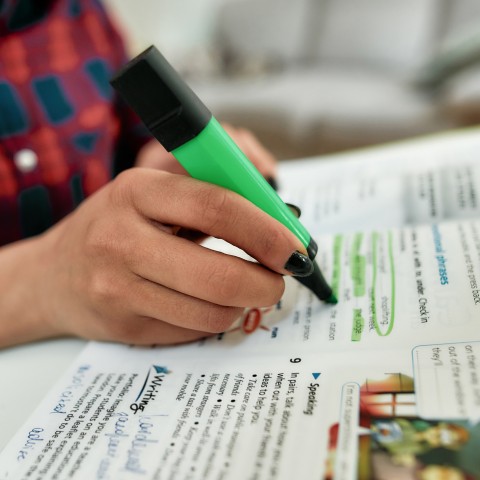
Czech Classroom Vocabulary––Supplies:
- Tužka – “Pencil”
- Pero or Propiska – “Pen”
- Poznámkový blok or Sešit – “Notebook”
- Pořadač – “Binder”
- Složka – “Folder”
- List papíru – “Sheet of paper”
- Kniha – “Book”
- Učebnice – “Textbook” (more common than “book”)
- Penál – “Pencil case”
- Pravítko – “Ruler”
- Guma – “Eraser”
- Nůžky – “Scissors”
- Kalkulačka – “Calculator”
- Ořezávátko – “Pencil sharpener”
Czech Classroom Vocabulary––Places and Things:
- Třída or Učebna (from the word učit – “learn”) – “Class” (the word “class” is more used in high schools and elementary schools)
- Kavárna – “Cafeteria”
- Sborovna – “Teacher’s room”
- Sekretariát – “Secretariat”
- Ředitelna – “Principal’s office”
- Kancelář – “Office”
- Menza – “University canteen”
- Knihovna – “Library”
- Kopírka – “Copy machine”
- Zkouška – “Exam”
- Test – “Test”
- Ústní zkouška – “Verbal exam”
- Písemná zkouška – “Written exam”
- Poslech – “Listening”
- Psaní – “Writing”
- Porozumění – “Understanding”
- Úkol – Homework
- Práce – “Assignment”
- Prezentace – “Slideshow” or “Presentation” or “Pitch”
3. What?: Czech Classroom Phrases When Asking for Clarification
Wisdom is knowledge, and as we say, žádný učený z nebe nespadl––”no educated one has ever fallen from the skies,” as in “practice makes perfect.”
- Nerozumím/nechápu. – “I don’t understand.”
- Můžete to zopakovat, prosím? – “Can you repeat that, please?” (formal voice, when asking the teacher)
- Můžu se na něco zeptat? – “Can I ask you something?” (literally just “can I ask on something”)
- Chci se na něco zeptat. – “I want to ask about something.”
- Co řekl/řekla? – “What did he/she say?”
- Můžete mi vysvětlit tuhle část, prosím? – “Could you explain this part to me, please?”
- Chci se ujistit, že to chápu. – “I want to make sure I understand this.”
- Není mi jasná jedna věc. – “One thing isn’t clear to me.”
- Co to znamená? – “What does it mean?”
- Takže to neznamená, že… – “So it doesn’t mean that…”
For more Czech questions (with pronunciation!), check out these lists.

4. Dog Ate My Homework: Czech Classroom Phrases for Apologizing and Absence
How to tell the teacher you aren’t able to attend their class or why you didn’t attend or why you were late? Read on:
- Není mi dobře, dnes nepřijdu. – “I’m not feeling well. I won’t be able to attend school today.” (literally just “I won’t come.”)
- Omlouvám se za zpoždění, musel/a jsem… – “Sorry I’m late. I had to…” (literally, “I’m sorry for the delay”)
- Můj pes mi sežral úkol. – “My dog ate my homework.”
- Chci se omluvit z dnešní hodiny, jdu k lékaři. – “I want to excuse myself from today’s lesson, I have a doctor’s appointment.” (literally, “I’m going to a doctor.”)
- Omlouvám se, nemám tu práci hotovou. – “I am sorry, I didn’t finish the assignment.” (literally “I don’t have the assignment finished.”)
- Omlouvám se, zapomněl/a jsem. – “I am sorry, I forgot.”
- Omlouvám se, ale mám spoustu práce a nestihl/a jsem to. – “I am sorry, but I have a lot of work and I didn’t make it.”
- Neměl/a jsem čas si to přečíst. – “I didn’t have time to read it.”
5. Classroom Vocabulary in Czech: My Favorite Subject Is…
- V [subject] nejsem moc dobrý/á. – “I’m not good at [subject].”
- Můj oblíbený předmět je [subject]. – “My favorite subject is [subject].”
- Nejde mi [subject]. – Literally “[Subject] doesn’t go me”, as in “I am not good in [subject].
- Jde mi [subject]. – Again, “[Subject] goes me.”
- Nejradši mám [subject]. – “I like [subject] the most.”
- Nenávidím [subject]. – “I hate [subject].”
- Chci studovat český jazyk. – “I want to study Czech language.”
List of School Subjects in Czech:

- Matematika – “Math”
- Biologie – “Biology”
- Chemie – “Chemistry”
- Angličtina – “English”
- Čeština – “Czech”
- Tělocvik – “PE”
- Literatura – “Literature”
- Dějepis (elementary school) or Historie – “History”
- Psychologie – “Psychology”
- Sociologie – “Sociology”
- Filozofie – “Philosophy”
- Geometrie – “Geometry”
- Ekonomie – “Economy”
- Politologie – “Politology”
- Zeměpis (elementary school) or Geografie – “Geography”
- Marketing – “Marketing”
- Management – “Management”
6. How CzechClass101.com Helps You Learn Czech in a Fun Way
That’s it, guys! I hope you enjoyed this article and learned something new! If the Czech words and phrases listed in this article weren’t enough for you, and you want to keep learning, please check out our Basic Bootcamp––basic Czech for foreigners (grammar and vocab) in 5 compact lessons.
If you’re taking Czech language learning seriously and want to study Czech fast, free, and online, you might grab a Czech grammar book or learn online (which is way more convenient). Seriously, mastering a new skill has never been easier. Just grab your phone and get to work!
CzechClass101.com will make online Czech classes easy, exciting, and fun. With us, it’s not about endless memorizing or thick textbooks. Study Czech the better way – with us you’ll make progress faster than you could imagine!
What can you find in these awesome online Czech lessons?
- English to Czech translation and pronunciation tips/tricks
- Over 630 audio and video lessons
- Vocabulary learning tools
- Spaced repetition flashcards
- Detailed PDF lesson notes
- Czech for foreigners––the better way
Ready to study the Czech language? Sign up now, it’s free!
One last thing: Let us know in the comments what YOUR favorite subject was (in Czech, of course). Share some useful tips and tricks!

The Ultimate Guide to Czech Restaurant Phrases

Who doesn’t love eating out? Especially in foreign countries! If you love exploring exotic cuisines or simply have to eat out while in the Czech Republic, this list of Czech restaurant vocabulary and phrases will come in handy.
I have noticed how much people appreciate it when a foreigner tries to speak Czech. It’s a tough language (or so I’ve heard), and locals get genuinely excited when they realize my fiancé is a REAL American who says děkuju (“thank you”) and prosím (“you’re welcome” and “please”). In the Czech Republic, the staff tends to be much nicer. In Barcelona, we were getting free desserts and complementary wine. Austrian baristas smile if I order my coffee in German. Enough about cultural differences; if you want to know more about Czech traditions and culture, check out this article.
It goes without saying that being able to read the Czech food menu or ask your waiter about allergens in your dish of choice (or explain basic Czech foods) might save you a lot of headaches.
I once ordered “latté” in an Italian café. I spoke (poor) English, and the Italian owner seemed confused but obliged, as the customer’s wishes shall be fulfilled no matter what. Guess what. I got what I asked for: latté––milk. First of all, had I come prepared, I would have known the drink of my choice is actually called “latté macchiato,” plus I would have been able to understand what the Italian owner was saying (“You want just milk? Milk without coffee?”).
Let’s learn from my mistakes and dive into this article––a comprehensive cheat sheet––Czech vocabulary on how to order food in Czech and basic Czech phrases.
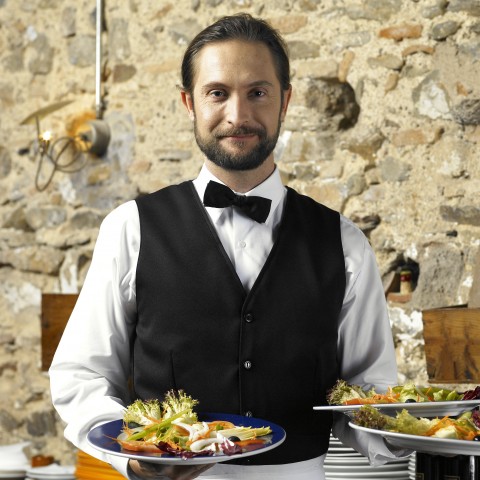
Číšník. – “Waiter.”
 Table of Contents
Table of Contents
- Restaurant Phrases in Czech: Getting There
- How to Order Food in Czech
- Czech Restaurant Phrases: After Dining
- How CzechClass101.com Helps You Learn Czech in a Fun Way
1. Restaurant Phrases in Czech: Getting There
- Chtěl/a bych rezervovat stůl pro dva na sobotu, 7. května, V pět hodin. – “I’d like to book a table for two on Saturday, May 7th, at 5pm.”
- Stůl pro čtyři, prosím. – “A table for 4, please.”
- Máte volný stůl na zahrádce? – “Do you have a table on the patio?”
- Jak dlouho budeme muset počkat? – “How long do we need to wait?”
- Nabízíte vegetariánské/veganské jídlo? – Do you offer vegetarian/vegan food?
- Máme rezervaci na jméno [name].– “We have a reservation for the name [name].”

Stůl pro dva, prosím. – “Table for two, please.”
A- Conversation Example:
| Staff | You |
| Dobrý den, restaurace Grandezza, jak vám mohu pomoci? “Hello, “Grandezza” restaurant, how may I help you?” | Dobrý den, chci rezervovat stůl na zítra večer. “Hello, I would like to book a table for tomorrow evening.” |
| Jistě. Pro kolik lidí? “Certainly. For how many people?” | Pro čtyři. “For four people.” |
| Přejete si stůl uvnitř nebo na terase? “Would you like a table inside or on the terrace?” | Na terase, pokud je to možné. “On the terrace, if that’s possible.” |
| Dobře. Na kolik hodin? “Okay. What time would you like to book?” | Na půl devátou. “At 8:30 PM.” |
| Výborně. Máte rezervaci na zítra, 20:30, pro čtyři lidi. “Great. You have a reservation for tomorrow at 8:30 PM, for four people.” | Mockrát děkuju. Na shledanou. “Thank you very much! Goodbye.” |
| Na shledanou. “Goodbye.” | – |
2. How to Order Food in Czech
- Můžeme dostat jídelní lístek? – “May we get the menu, please?”
- Chtěli bychom si objednat. – We would like to order.
- Co nám doporučíte? – “What would you recommend?”
- Máte nějakou místní specialitu? – “Is there a local specialty?” (Literally, “Do you have a local specialty?”)
- Co je dnešní specialita? – “What’s today’s special?”
- Co je v tomhle jídle? – “What is in this dish?” (asking about ingredients)
- Mám alergii na [ingredient]. Je v tom [ingredient]? – I am allergic to [ingredient]. Is there [ingredient] in this?
- Bez sýra, prosím. – “Without the cheese, please.” (if you want to remove a certain ingredient)
- Víc/míň [ingredient], prosím. – “More of the [ingredient] please.” (asking for extras)
- Dám si řízek. – “I’ll have the schnitzel.”
- Chtěla bych maso mírně/středně/dobře propečené. – “I would like my meat rare/medium/well done.”
- Můžu dostat příbory, prosím? – “Can I get utensils, please?”
- Kde jsou toalety, prosím? – “Where is the restroom, please?”
- Můžu dostat víc ubrousků? – Can I get some more napkins?
- Ta polévka je trochu přesolená. – The soup is a little salty. (Literally, “The soup is a little oversalted.”)
- Bylo to vynikající. Moc nám chutnalo. – “It was delicious. We enjoyed it very much.” (literally “It tasted us very much.”)
- Mohlo to být lepší. – “It could have been better. (as in “It wasn’t anything special.”)
- Nebylo to dobré. – “It didn’t taste good.” (Literally “It wasn’t good”)
- Nechutnalo nám. – “We didn’t like it.” (Literally “Didn’t taste us.”)
- Moje jídlo je studené. – “My food is cold.”
- Moje pití není vychlazené. – “My drink is not chilled.”
- Můj drink chutná divně. – “My drink tastes strange.”
- Tohle není pořádně uvěřené. – “This isn’t properly cooked.”
- Objednali jsme si před půl hodinou. – “We ordered half an hour ago.”
- Tohle jsem si neobjednal. – “This isn’t what I ordered.”
I suggest you check out the list of basic Czech food vocabulary here.

Tohle jsem si neobjednal. – “This isn’t what I ordered.”
A- Conversation Example:
| Staff | You |
Co si dáte? “What will you have?” | Jako předkrm si dám salát. “As a starter, I will have the salad.” Jako hlavní chod si dám burger. “As an entrée, I will have the burger.” Jako dezert si dám čokoládový dort. “For dessert, I will have the chocolate cake.” |
| Co si dáte k pití? “What will you have to drink?” | Suché bílé víno. Máte Sauvignon? “Dry white wine. Do you have Sauvignon?” |
| Ano. Jedno deci? “Yes. One deciliter?” | Ano, děkuju. “Yes, thank you.” |
| During the meal: | |
| Je všechno v pořádku? Chutná vám? “Is everything alright? Do you like the food?” | Je to moc dobré, díky. “Yes, very good, thank you.” |
| – | Můžu dostat víc pečiva, prosím? “Can I have some more bread, please?” |
| – | Dám si ještě jedno víno, prosím. “I’d like another glass of wine, please.” (You’re asking for “another wine”, we typically don’t say “a glass of wine/beer, a cup of coffee”, just “another wine, beer, coffee”) |
| – | Můžu dostat kečup? “Can I get ketchup?” |
| Samozřejmě, hned to bude. “Of course, right away.” (Literally, “It will be right away.”) | Děkuju. “Thank you.” |
| Dáte si dezert? “Will you have some desserts?” | Dám si větrník, prosím. “I’d have the větrník, please.” |

Co si dáte? – “What will you have?”
3. Czech Restaurant Phrases: After Dining
Účet, prosím. Zaplatíme. – “Check, please. We’re going to pay.”
Můžeme zaplatit zvlášť? – “Can we pay separately?”
Zaplatím za všechny. – “I will pay for everyone.”
Můžeme mít dvě krabičky? – “Can we get two boxes?”
Zabalíte nám zbytek s sebou? – “Would you pack the rest to-go?”
Přijímáte/berete kreditní karty? – “Do you accept/take credit cards?”
Řekněte kuchaři, že to bylo vynikající! – “Tell the chef it was delicious.” (“Compliments to the chef.”)
Česká jídla jsou mastná. – “Czech meals are greasy.”
A- Conversation Example:
| Staff | You |
| – | Můžu zaplatit, prosím? “May I pay, please?” |
| Jistě, hned jsem u vás. “Sure, I’ll be with you right away.” | – |
| Hotově, nebo kartou? “Cash or card?” | Kartou, prosím. “Card, please.” |
| Dohromady, nebo zvlášť? “Together or separately?” | Dohromady, zaplatím za všechny. “Together, I will pay for all.” |
| Tisíc dvě stě jedna korun, prosím. “1.201 crowns, please.” | Nechte to na tisíc tři sta. “Keep it at 1.300.” (“Round it up to 1.300.”) |
| Děkuji, přeji hezký den. “Thank you, I wish you a nice day.” | Na shledanou. “Goodbye.” |
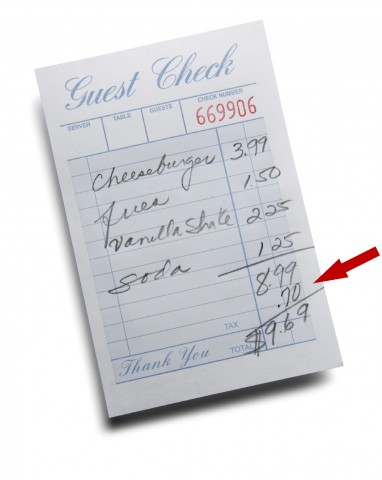
In the Czech Republic, service is always included.
B- Tipping in the Czech Republic
Customer service in the Czech Republic is very different from what you probably know from other countries––overly friendly and smiles are rare, and tipping is more about the actual service/food.
Bottom line: You do NOT have to tip.
If you decide to tip:
- ➢ You either tip a standard 10 percent or round up the check to the next hundred crowns––this is way more common here.
➢ If you’re paying by card or handing the waiter a larger note, always tell them how much you want to tip in advance.
➢ Using cash is becoming pretty rare.
➢ It’s not common to leave money (even if it’s just the tip) on the table.
➢ If you see a “Service is not included” note on your check, please remember that service is ALWAYS included (legally speaking), and you’re NOT obliged to tip if you don’t want to.
4. How CzechClass101.com Helps You Learn Czech in a Fun Way
That’s it, guys! I hope you enjoyed this article and maybe you even know how to say french fries in Czech (hranolky)! In case the location words and phrases listed in this article weren’t enough for you, and you want to keep learning, please check out our Basic Bootcamp – the very basic grammar and vocab in 5 compact lessons.
If you’re taking learning Czech seriously, and want to learn Czech fast, free and online, you might grab a Czech grammar book or learn online (which is way more convenient). Seriously, learning a new skill has never been easier. Just grab your phone and get to work!
CzechClass101.com will make learning Czech easy, exciting, and fun. With us, it’s not about endless memorizing or thick textbooks. Learn Czech the better way – with us you’ll make progress faster than you could imagine!
What can you find here?
- English to Czech translation and pronunciation tips/tricks
- Over 630 audio and video lessons
- Vocabulary learning tools
- Spaced repetition flashcards
- Detailed PDF lesson notes
Sign up now, it’s free!
One last thing: Let us know in the comments your funny restaurant stories (in Czech, of course). Which Czech phrase from this article will you use the most? We look forward to hearing your answers.

Czech Conversation Skills: Speak It Like You Mean It!

You probably know that speaking another language means that you just… Speak it. Freely. Without thinking about every word. Without pausing to remember the “correct” word, without translating in your head.
The best way to improve your Czech conversation skills: Prepare your “language profile”, learn a few tricks that will make you sound natural and like you speak Czech daily (even when you don’t). You can make your language skills and pronunciation seem way more advanced, and amaze yourself, native speakers, and fellow students alike. It doesn’t matter how old you are. Again, you can do it at any age.
What’s the game plan?
1. Learn phrases about your job, hobbies, life, family, etc.
2. Learn phrases about your potential clients/friends/colleagues jobs, hobbies, life, family, etc.
3. Learn common phrases: how to check in, order food, buy tickets, etc.
4. Improve your conversation skills in Czech by learning global topics/politics vocab.
5. Learn a few conversation starters
6. Learn a few reactions and filler words (this makes you sound like you own the language and are super comfortable speaking it).
Let’s dive right into it.

Friends.
 Table of Contents
Table of Contents
- I am Bob and I Like Cheese: Your Own Czech Language Profile
- Mmmhmmm: Learn Czech Reactions
- Fill the Void… With Czech Filler Words
- Learn Common Czech Questions and Answers
- Learn Czech Conversation Starters
- How to Improve Your Czech Speaking Skills
- How CzechClass101.com Helps You Learn Czech in a Fun Way
1. I am Bob and I Like Cheese: Your Own Czech Language Profile
Start with the basic stuff, and try to keep things simple. Think about what questions you get asked the most when you’re “new” and what questions “new” people ask you. You’ll find more examples and pronunciation here. I suggest you check out this list of phrases you should know before you travel to the Czech Republic.
Jmenuju se [name]. – “My name is [name].
Je mi [age] let. – “I am [age] years old.” (Literally, “I have XX years.”)
Jsem [job title]. / Pracuju jako [job title]. – “I am an [job title]. / I work as [job title].”
Studuju [subject]. – “I study [subject].”
Jsem nezadaná/nezadaný. – “I am single.”
Jsem ženatý/vdaná. – “I am married.”
Mám partnera/partnerku. – “I have a partner.”
Mám [count] děti/dětí. – “I have [count] kids.”
Jsem jedináček. – “I’m an only child.”
Mám bratra a sestru. – “I have one bratr and one sister.”
Miluju [hobby in 4th case noun]. – “I love [hobby, noun].”
Rád/a [verb in 1st person singular]. – “I like to [hobby, verb].
Zajímám se o [noun, 4th case]. – “I am interested in [noun].”
Baví mě [noun, 1st case OR verb in infinitive]. – “I like [hobby, activity].”
Česky se učím asi rok. – “I have been learning Czech for about a year.”
Nikdy jsem nežil/a nikde v zahraničí. – “I have never lived abroad.”
Žila jsem rok/let [year/years] v zahraničí – [countries]. – “I have lived abroad for [year/years]––[countries].
Relaxed example (speed-dating style):
Ahoj, já jsem Martina, je mi 36 let. Pracuju jako překladatelka, jsem jedináček a žiju ve městě. Miluju psy, ráda vařím, baví mě pečení. Zajímám se o politiku a psychologii.
“Hi, I am Martina, I am 36 years old. I am a translator, I’m an only child and I live in a city. I love dogs, I like cooking, and I enjoy baking. I am interested in politics and psychology.”
Slightly more “polite” example (job interview style):
Dobrý den, jmenuju se Pavel, je mi 30 let. Tři roky pracuju jako kodér, ale vystudoval jsem historii. Zajímám se o nové technologie, jsem extrovert a rád pracuju v týmu. Jde mi vedení lidí.
“Good day, my name is Pavel, I am 30 years old. I’ve been working as a coder for three years, I have a degree in history. I am interested in new technology, I like teamwork. I’m good at managing people.”
Very relaxed example:
2. Mmmhmmm: Learn Czech Reactions
Unless you want to nod and smile or shake your head furiously. I’m trying to think about really genuine Czech reactions right now, and I’d say we make a lot of unintelligible noises––more than English speakers––there’s no “oh” or “duh”, just lots of mmmhmmm (oh yeah) and hmhm (no).
Bezva. – “Cool.” (Sort of outdated, and young people will just say “cool”; colloquial)
Aha. – “Aha.” (As in, “now I understand” or “sure, I know you’re making excuses.”)
Výborně. – “Great.”
Dobře. – “Good.”
Tak jo. – “OK.” (Literally “So yeah”; colloquial)
Jsme domluvení. – “Settled.” (Literally “we’re set up.”)
Počítám s tím. – “I’m counting on it.”
Omlouvám se. – “I apologize.” (Sounds very official and big––save for when you do something really horrible.)
To mě mrzí. – “I am sorry.”
Pardon. – “Pardon.” (Very polite)
Nezlobte se. – “Don’t be angry.” (As in, “I’m sorry.”)
S dovolením. – “Excuse me.” (When someone is in your way or you want to interrupt their monologue.)
V pořádku. – “Alright.” (As in “it’s alright.”)
Nic se neděje. – “Nothing is happening. (As in “it’s fine”)
To je dobrý. – “That’s ok.” (Slang version, the ending should be -é.)
V pohodě. – “Cool.” (Colloquial)
Dobrý. – “Good.” (Slang version, the ending should be -é.)
Fajn. – “Fine.” (Colloquial)
OK is mostly used in written form (OK, ok, Ok). Some people do use it, in which case it would be pronounced as ó-ká or okey.
Example:
- Mohl bys mě vyzvednout zítra ráno v sedm? (“Could you pick me up tomorrow at 7AM?”)
Aha, já myslel, že vyrazíme později. (“Oh, I thought we’d leave later.”)
Výborně, už se těším. (“Great, looking forward to it.”)
Jsme domluvení, počítám s tím. (“Settled, I’m counting on it.”)
Fajn, ale říkalas, že vyrazíme dřív. (“Fine, but you said we would leave earlier.”)
- Nezlob se, ale tvoje reakce mi připadají nevhodné. (“Don’t be mad, but I find your reactions inappropriate.”)
V pořádku, je to tvůj názor a já ho respektuju. (“It’s alright, it’s your opinion and I respect it.”)
V pohodě, nic se neděje. Je mi jedno, co si myslíš. (“Cool, it’s fine. I don’t care what you think.”)
- Pardon, šlápla jsem vám na nohu. (“Pardon me, I stepped on your toes.”)
To je dobrý, jste lehká jako pírko. (It’s ok, you’re light as a feather.”)
V pohodě, nic se nestalo. (“It’s ok, nothing happened.”)

OK
3. Fill the Void… With Czech Filler Words
I’d say that Czech filler sounds are a lot more common than Czech filler words (I guess we like to squirm and growl). There’s a lot of uhhhhh and hmmmm, and you can follow suit, of course, BUT! Using Czech filler words will make you sound very relaxed and natural. Czech out our article here.
Tak. – “So” or “Well”
Takže. – “So”
No. – “Well”
Dá se říct. “It’s possible to say.”
Můžeme říct. – “We can say.”
Prostě. – “Just” or “Simply”
Vlastně. – “Actually”
Jako. – “Like”
Jakoby. – “As if”, often used as the American “like”.
Example:
Takže ty si myslíš, že nemusíš nic dělat. (“So you think you don’t have to do anything.”)
Vlastně tě chápu, na tvém místě bych si myslel totéž. (“Actually, I understand, I’d think the same if I were in your place.”)
Pojďme se prostě shodnout na neshodě. (“Let’s just agree to disagree.”)
Jako… Ona musí být úplně hloupá. (“Like… She must be completely stupid.”)
Bylo to… Jakoby… Nevím, jak to popsat. (“It was… As if… I don’t know how to describe it.”)
4. Learn Common Czech Questions and Answers
You can find the most common Czech questions here, and it’s a good idea to check out 25 must-know intermediate phrases as well.
Czechs won’t intrude and ask a lot of questions. In fact, don’t be surprised if they don’t ask anything at all.
Odkud jsi? – “Where are you from?”
Jsem z Ameriky. ( “I’m from America.”)
Jsem z daleka. (“I’m from far away.”)
Jak se máš? – “How are you?”
Dobře, děkuju. (“Good, thanks.”)
Nic moc. (“Nothing much” as in “not very good”)
Kde jsi se naučil/a česky? – “Where did you learn Czech?”
Chodil jsem do kurzu a používal aplikaci. (“I took classes and use an app.”)
Ve škole/v práci. (“At school/work.”)
Používáš nějakou aplikaci, nebo chodíš do kurzu? – “Do you use an app or do you take classes?” (Literally (“or do you go to a course”)
Obojí. Kurz mě moc baví. (“Both. I like the class a lot.”)
Chodím do kurzu. (“I take classes.”)
Proč se učíš česky? – “Why are you studying Czech?”
Protože to potřebuju k práci. (“Because I need it for work.”)
Ze soukromých důvodů. (“For personal reasons.”)
Kolika jazyky mluvíš? – “How many languages do you speak?”
Mluvím dvěma jazyky. (“I speak two languages.”)
Zatím jen jedním, ale učím se druhý. (“Just one so far, but I am learning my second one.”)

How old are you?
5. Learn Czech Conversation Starters
I like to start with a compliment (clothes, food, dogs, babies, hair)––everybody likes to feel special, and you only have one shot at making a great first impression.
Get inspired: Here’s our list of Czech conversational phrases. Learn the most useful compliments here and here.
- Moc se mi líbí tvoje tričko. Kde jsi ho koupil/a? – “I like your shirt. Where did you get it?”
Máma mi ho dala k Vánocům. (“My mom gave it to me for Christmas.”)
- Mohl/a bys mi s něčím pomoct? – “Could you help me with something?”
Sorry, nemám čas. (“Sorry, I don’t have time.”)
- Můžu si k tobě/vám přisednout? – “Can I sit here with you?”
Samozřejmě, posaďte se. (“Of course, take a seat.”)
- Chodíš sem často? – “Do you come here often?”
Jo, každý týden. (“Yeah, every week.”)
- Jaký film máš nejradši? Jaká/jaké je tvoje nejoblíbenější knížka/jídlo? Kdo je tvůj nejoblíbenější autor/herec/zpěvák? – What’s your favorite [movie/book/food/author/actor/singer]?”
Miluju Lennyho Kravitze. (“I love Lenny Kravitz.”)
- Vždycky jsi chtěl/a být [job title]? – “Have you always wanted to be [job title]?”
Ne. Vlastně ani nevím, jak se to stalo. (“No. Actually, I have no idea how it happened.”)
- Baví tě tvoje práce/škola? – “Do you like your job/school?”
Vůbec. Lituju, že jsem nešel na medicínu. (“Not at all. I regret not going to med school.”)
- Líbí se ti tahle hudba/typ umění? Máš rád/a tuhle kuchyni? – “Do you like this kind of music/art? Do you like this cuisine?”
Je moje nejoblíbenější (“It’s my favorite.”)
- Líbí se ti tu? – “Do you like it here?”
Ujde to. (“it’s fine.”)

You look great today.
6. How to Improve Your Czech Speaking Skills
1. Make it personal, and go with the flow. Talking about yourself and things you care about is always easy and fun.
2. You will likely use certain reactions a lot more than others––these don’t have to be your “favorite” first language words. I never say OK in Czech, but I say it all the time in English.
Just find what feels more natural, do not try to translate everything accurately, to a tee.
3. Whenever you catch a word/topic that you often use, write it down, translate it, and learn how to say it in Czech.
4. Get exposure – movies, podcasts, videos. You need to listen in order to repeat and mimic.
5. Get feedback. Start with small, simple conversations: order your food in Czech, talk to your taxi driver in Czech, etc. This sounds like a banal, trite “tip” (I’m bored of it too!), but trust me: This is how you get used to speaking another language. Learn the most common Czech restaurant phrases, talk to the waiter in Czech, thank them in Czech, and then do it again when you have the chance.
6. Practice speaking out loud (preferably in front of a mirror) – get used to your own voice speaking another language, embrace your accent and make sure you work hard on making your pronunciation sound as close to the “original” as possible.

Shadow a native speaker to practice your pronunciation.
7. How CzechClass101.com Helps You Learn Czech in a Fun Way
That’s it, guys! I hope you enjoyed this article and learned something new! In case the nationality words and phrases listed in this article weren’t enough for you, and you want to keep learning, please check out our Basic Bootcamp – the very basic grammar and vocab in 5 compact lessons.
If you’re taking learning Czech seriously and want to learn Czech fast, free and online, you might grab a Czech grammar book or learn online (which is way more convenient). Seriously, learning a new skill has never been easier. Just grab your phone and get to work!
CzechClass101.com will make learning Czech easy, exciting, and fun. With us, it’s not about endless memorizing or thick textbooks. Learn Czech the better way – with us, you’ll make progress faster than you could imagine!
What can you find here?
- English to Czech translation and pronunciation tips/tricks
- Over 630 audio and video lessons
- Vocabulary learning tools
- Spaced repetition flashcards
- Detailed PDF lesson notes
Sign up now, it’s free!
One last thing: Let us know in the comments if this article helped you, and if you feel inspired to start (or continue) learning Czech now! Do you feel more prepared to start your first several convos in Czech now?

Hey, How You Doin’?: Czech Conversation Starters

We aren’t all super bubbly extroverts, and starting a conversation is not always easy.
It doesn’t matter if you are at a party with native speakers, at your new job/school, or sitting by yourself in a café––there MIGHT be a situation where you just want to interact with a stranger. Or worse: You will have to interact. Unless you don’t mind being “the quiet one.”
How about starting a basic Czech conversation (or a conversation in any foreign language)? I remember how anxious this made me feel in my first job. Almost 75% of my coworkers were foreigners from all over the world (with accents), and everytime I met one of them in the kitchen, I was SO awkward. It still makes me cringe when I think about it.
How to start a conversation in Czech? Things are a little different around here, and we’re not the most friendly folks you have ever met. However, when someone asks jak se máš? (“how are you doing?”) they actually mean it. And when a complete stranger strikes up a convo at a pub or in the canteen, they actually want to talk to you––they are not just being polite.
Also, it’s not usual to talk to strangers on public transportation unless you need something, or in the line at the cash register, again, unless you need something. The best Czech conversation starter practice should ideally take place at a bar, at work, at school, or someplace fun. No worries, it’s going to be a breeze. Just smile.
In this article, you will learn Czech conversation starters for socializing, a first date, Czech basic conversation starters for your first day at school or work, and a few tips on how to start an email or a text in Czech.

Jak se jmenuješ? – What’s your name?
 Table of Contents
Table of Contents
- So… Do You Like H’ordeuvres?: How to Start a Conversation at a Party
- Hello, Is It Me You’re Looking For?: First Day at a New School or Job
- You’re Almost as Pretty as My Ex: Conversation Starters for your First Date
- U Up?: How To Start an Email or Text Conversation
- How CzechClass101.com Helps You Learn Czech in a Fun Way
1. So… Do You Like H’ordeuvres?: How to Start a Conversation at a Party
First things first: We don’t call them h’ordeuvres. In Czech, they’re jednohubky, which literally means “one mouthers” (guess why), chlebíčky, or just food. And food is a GREAT icebreaker. Another awesome topic for socializing and mingling is the host of the event you’re currently at, and compliments.
Flattery will get you anywhere, and if you’re not skilled in this sophisticated art, check out our article here and our list of phrases here––they’re useful for any Czech learner.
All of the following conversation starters are in the second person singular, masculine/feminine. In case you are not sure what these words even mean, I suggest you start here.
- Kde jste se seznámili s [the host]? Odkud znáš [the host]? – “How did you meet/know [the host]? Where did you meet XX?”
- Co to jíš? Co to piješ? Vypadá to skvěle. – “What is that you are eating? What is it that you are drinking? It looks great.”
- Chutná ti to? – “Do you like it?” (literally, “does it taste to you?”)
- Jak dlouho ti trvala cesta? – “How long did it take for you to get here?” (literally, “how long did your journey take?”)
- Kde pracuješ? Co děláš za práci? – “What do you do for a living?”
- Jdu si pro něco k jídlu. Jdu si pro něco k pití. Dáš si něco? – “I’m going to get some food. I’m going to get something to drink. Would you like anything?”
- Bavíš se dobře? – “Are you having fun?”
- Líbí se ti tahle hudba/typ umění? Máš rád/a tuhle kuchyni? – “Do you like this kind of music/art? Do you like this cuisine?”
- Chodíš na takové akce často? – “Do you attend such events often?”
- Chodíš často na večírky? – “Do you party a lot?”
- Chodíš často ven, nebo jsi radši doma? – “Do you go out often or do you prefer to stay in?”

To byl skvělý večer. – That was a great night.
2. Hello, Is It Me You’re Looking For?: First Day at a New School or Job
We have all been there, the first days are tough. However, the following phrases will make your transition phase a lot easier.
Just smile, breathe and say:
- Zdravím, já jsem [name]. Jsem tu první den. Jak ti mám říkat? – “Hi, my name is [name]. It’s my first day here. What should I call you?”
- Pardon, jsem to nový/nová a nevyznám se tu. Kde najdu [place/person]? – “Excuse me, I’m new and don’t really know my way around here. Where can I find [place/thing/person]?”
- Můžu s tebou jít na oběd? – “Can I join you for lunch?”
- Je tu volno? – “Is this seat free?” (literally, “is it free here?”)
- Můžu si přisednout? – “Can I sit here with you?”
- Jak dlouho tu studuješ/pracuješ? – “How long have you been working/studying here?”
- Moc se mi líbí tvoje tričko. Kde jsi ho koupil/a? – “I like your shirt. Where did you get it?”
- Můžu se k tobě přidat? – “May I join you?”
- Mohl/a bys mi s něčím pomoct? – “Could you help me with something?”
- Hledám [person/place/thing], nevíš, kde je? – “I’m looking for [person/place/thing], do you know where it is?” (literally (“don’t you know where it is?”)
Check out this school-related vocabulary or listen to this Czech conversation about jobs for absolute beginners.

První den. – First day.
3. You’re Almost as Pretty as My Ex: Conversation Starters for your First Date
In my opinion, dates and any interaction with our love interests are the best “Czech conversation starters” lesson: If you really like the person, you will ultimately want to talk to them, and your motivation will propel you forward in your language learning journey. Take a look at this article about how falling in love might help you learn Czech faster.
I think “we’ve all been there” applies to this too––your ex is probably not the best topic.
These are much better options, get inspired:
- Moc ti to sluší! Líbí se mi tvůj účes/outfit/parfém. – “You look great! I like your [hair/outfit/perfume].” (literally, “it suits you!”)
- Kde jsi vyrůstal/a? – “Where did you grow up?”
- Chodíš sem často? – “Do you come here often?”
- Tohle je tvoje oblíbená restaurace/kavárna? – “Is this your favorite restaurant/café?”
- Máš nějaké zvíře? – “Do you have a pet?”
- Jaký film máš nejradši? Jaká/jaké je tvoje nejoblíbenější knížka/jídlo? Kdo je tvůj nejoblíbenější autor/herec/zpěvák? – What’s your favorite [movie/food/actor/singer]?”
- Co nejraději děláš ve volném čase? – “What do you like to do in your free time?” (literally, “what do you like the most to do in your free time?”)
- Pracuješ hodně? – “Do you work a lot?”
- Máš hodně zájmů? – “Do you have many hobbies?” (literally, “interests”)
- Máš hodně přátel? – “Do you have a lot of friends?”
- Co tě baví? – “What do you enjoy?” (as in, “What do you like about life?”)
- Co tě nebaví? – “What do you dislike?” (again, a general question about the person’s outlook on pretty much anything. Their answer might be Škola! (“School!”) or Lidi, co se hloupě vyptávají (“People who ask silly questions.”)––anything works.
- Baví tě tvoje práce/škola? – “Do you like your job/school?”
- Vždycky jsi chtěl/a být [job title]? – “Have you always wanted to be [job title]?”
Did the first date go well? You might want to take a look at this.

Kiss.
4. U Up?: How To Start an Email or Text Conversation
Emails and texts are easy. You’re probably (hopefully) texting someone who knows you have their number, you’ve introduced yourself, and now you just want to be friendly or charming––depending on your intentions.
I suggest you check out these must-know Czech social media phrases, too, just to make sure you’re fully acquainted with the Czech virtual communication specifics. Not enough? Here’s a second helping––how to post in Czech.
- Čau, co máš v plánu na tenhle víkend? – “Hey, what do you have planned this weekend?”
- Dlouho jsme se neviděli. Zavolej mi, až budeš mít čas. Chci vědět, co je nového! – “It’s been a while. Give me a call when you have a chance. I’d like to catch up with you!”
- Musím ti říct, jaká blbost se mi stala. Kdy se sejdeme? – “I’ve got to tell you the dumbest thing that has ever happened to me. When will we meet up?” (blbost literally means “stupidity,” and it’s a colloquial word)
- Pomoc! Které šaty si mám vybrat? Modré, nebo fialové? – “Help! Which dress should I choose? Blue or purple?”
- Chceš slyšet něco srandovního? – “Wanna hear something funny?” (srandovní is a colloquial word derived from the word sranda, which means “fun”)
- Hádej, co se dneska stalo. – “Guess what happened today.
- Hádej, kdo mi dneska psal. – “Guess who texted me today.”
- Hádej, koho jsem dneska potkal/a ve městě. – “Guess whom I met earlier today in town.”
- Uviděl/a jsem tuhle knížku/tyhle šaty/tenhle meme/tohle a vzpomněl/a jsem si na tebe. Jak je? – “I saw this book/this dress/this meme/this, and thought of you. How is it going?” (Jake je? Is a very informal phrase that you should only use with people you know well)
- Napadlo mě že by se ti to mohlo líbit. – “I thought you might like this.”

Writing an email.
5. How CzechClass101.com Helps You Learn Czech in a Fun Way
CzechClass101.com will make learning Czech easy, exciting, and fun. With us, it’s not about endless memorizing or thick textbooks. Learn the Czech language with us and make progress faster than you could imagine!
What can you find here?
- Learn English to Czech translation and pronunciation tips/tricks
- Over 630 audio and video lessons
- Vocabulary learning tools
- Spaced repetition flashcards
- Detailed PDF lesson notes
Sign up now, it’s free!
One last thing: Let us know in the comments if this article helped you and when you plan to start practicing these in real life! An upcoming date, a party, or maybe a spontaneous interaction on the street? We look forward to hearing from you!

Advanced Czech Phrases

No matter how good you are, there’s always room for improvement, especially when it comes to learning another language. If you’ve decided to step up the game and embellish your Czech vocabulary, this article will make it easier for you. In this article, I’ve listed 40+ useful advanced Czech phrases that you can use in various conversations, while polishing your resumé in Czech, while writing a paper, or while chatting with your Czech friends and colleagues.
Czech is a fun, colorful language: We love using idioms and slang, and you know by now that the loose word order allows for some strange Czech sentence structures (i.e., a full sentence can consist of just one word).
Remember that building vocabulary is much faster, more efficient, and lots more fun when you’re working with full sentences or phrases. Frankly, memorizing words one by one is quite ineffective and exhausting—especially when you’re past the beginner mark, and you want to actually talk and think in Czech.
Learning should be fun (otherwise, you won’t stick with it), and if you enjoy what you do, you’re more likely to keep doing it—and practice makes perfect. Trust me. I know what I’m talking about. I started learning Norwegian several months ago at the ripe old age of 35, and I find the process much easier and more enjoyable than back in the 90s when it was (supposedly) easier for me to learn new things (it wasn’t).
Here’s my recommendation: When you’re done reading this article, write down all the sentences you know you’ll need in the future and rewrite them so that they become “yours.” Use words and situations that speak to you, fit into your life, mesh with your personality, make you laugh, make you cringe, make you FEEL something. When words become feelings, it’s pretty much impossible to forget them.
I kept these examples pretty neat and simple. Feel free to work with my suggestions and make them your own.

Don’t you want to sound smart?
 Table of Contents
Table of Contents
- Advanced Czech Phrases for Academic Writing
- Czech Power Phrases for a Resumé: Get Hired Right Away
- Smart Czech Phrases for Business and Meetings
- Advanced Czech Idioms, Sayings, and Proverbs for Everyday Usage
- How CzechClass101.com Helps You Learn Czech in a Fun Way
1. Advanced Czech Phrases for Academic Writing
Writing essays can be easier than we like to think. Use these advanced phrases in Czech and English as a cheat sheet. Remember: If you want to sound extra knowledgeable, write long (LONG) sentences with a lot of “smart stuffing”—words and phrases with very little meaning that sound smart and, if possible, take up a lot of space.
| Czech | English |
| S ohledem na podmínky výzkumu jsou výsledky nesmírně působivé. | “In view of the research conditions, the results are immensely compelling.” |
| Ve světle událostí jsme změnili názor. | “In light of the situation, we changed our opinion.” |
| Jak autor opakovaně zdůraznil, experimenty mohou prokázat teorie. | “As the author often reiterated, experiments can prove theories.” |
| Jeho kniha byla vybrána pro ilustraci potenciálního dopadu studie. | “His book was selected to give an illustration of the potential impact.” (literally: “for illustration”) |
| Jeho metoda odkazuje na názory starověkých filozofů. | “His method refers to the views of ancient philosophers.” |
| Klíčovým faktem, který je třeba zvážit, je, že zdroj nezahrnuje ženy. | “A key fact to consider is that the source doesn’t include women.” (literally: “A key fact that needs to be considered”) |
| Přesvědčivé shrnutí demonstruje všechny jeho názory. | “The persuasive summary exemplifies all of his views.” |
| Tyto dva argumenty jsou stejně významné. | “These two arguments are of equal significance.” (literally: “are equally significant”) |
| Experti předpovídali, že ekonomika zkolabuje, ale ona naopak začala růst. | “Experts predicted the economy would collapse, but, to the contrary, it started to grow.” |
| Nový přístup by na druhou stranu mohl přinést větší zlepšení než tradiční metody. | “Alternatively, the new approach might bring bigger improvements than traditional methods.” (literally: “on the other side”) |

Writing essays is impossible without the right vocab.
2. Czech Power Phrases for a Resumé: Get Hired Right Away
Do you want to land the job of your dreams? Remember that you want to be noticed before your future boss even reads your name on your resumé.
Here’s a little trick that has nothing to do with language or smooth-talking people into hiring you: Use a different background color. In the ocean of black letters on a white background, be “the one with the gray/yellow/ugly brown” resumé.
And don’t forget to get ready for your interview.
These advanced phrases in Czech sound rather professional and uptight (suitable for corporate jobs). If you want to work at a hip digital agency (from home), feel free to make things less official.

Be the one with the most compelling resumé.
| Czech | English |
| Jsem kompetentní v mnoha oblastech. | “I demonstrate competence in many areas.” |
| Efektivně zvládám i výjimečné úkoly. | “I effectively handle special assignments.” |
| Flexibilně se adaptuji na nové podmínky. | “I am flexible in adapting to new conditions.” (literally: “I flexibly adapt to…”) |
| Umím se účinně vyrovnat s rychlými změnami. | “I can effectively cope with fast changes.” |
| Mám pestré pracovní zkušenosti. | “I have diverse professional experience.” (literally: “colorful”) |
| Jsem výjimečně mnohostranný/mnohostranná. (masculine/feminine) | “I am exceptionally versatile.” |
| Dbám na efektivní využívání času. | “I ensure time effectiveness.” |
| Zachovám klid i ve vypjatých situacích. | “I keep calm in tense situations.” |
| Umím přijmout zodpovědnost za svá vlastní rozhodnutí. | “I am able to accept responsibility for my own decisions.” |
| Jsem schopen/schopna přijmout větší míru odpovědnosti. (masculine/feminine) | “I am capable of assuming greater responsibility.” |
| Jsem proaktivní. | “I am proactive.” |
| Rychle a snadno se učím novým věcem. | “I learn new things quickly and easily.” |
| Navrhuji konstruktivní řešení. | “I offer constructive solutions.” |
3. Smart Czech Phrases for Business and Meetings
You should know that Czech uses a lot of English words, such as byznys (“business”), challenge, meeting, etc.

Thank you for coming.
| Czech | English |
| Odstartovali jsme ten projekt před pár měsíci. (professional) | “We got the project off the ground a few months ago.” |
| Mezi těmito dvěma projekty existuje jistá jednotnost. (professional) | “There is a certain amount of synergy between these two projects.” |
| Hlavním tématem dnešního meetingu je digitální transformace. (professional) | “The main topic of today’s meeting is digital transformation.” |
| Naše firma vyvíjí FinTech aplikace a software. (professional) | “Our company develops FinTech applications and software.” |
| Jsme tu všichni, takže zahájíme dnešní program. (professional) | “Now that everyone’s here, let’s get started with today’s agenda.” (literally: “we will start today’s agenda”) |
| Pustíme se do toho. (slang) | “We will get into it.” (literally: “We will let us into it.”) |
| Probereme to na Zoomu. (slang) | “We will talk about it/discuss it on Zoom.” |
| Musíme to probrat. (slang) | “We need to talk about it.” |
| První položkou na programu, kterou dnes potřebujeme probrat, je zvýšení prodeje, a jak ho dosáhneme na globální úrovni. (professional) | “The first item on the agenda that we need to discuss today is increasing our sales and how we achieve that on a global level.” |
| Děkuji všem za účast. (professional) | “Thank you all for attending.” |
4. Advanced Czech Idioms, Sayings, and Proverbs for Everyday Usage
Czechs love idioms, and as an advanced learner, you need to navigate through their lovely dirt roads.

Hand on heart, I am in the seventh heaven.
| Czech | English |
| Měl bys kápnout božskou. | “You should spill the beans.” (literally: “You should drip the godly.”) |
| Jde mi z toho hlava kolem. | “It makes my head go around.” (It’s confusing/too much.) |
| Nemaluj čerta na zeď. | “Don’t draw a devil on the wall.” (Don’t expect/talk about the worst outcome in advance.) |
| Má to své mouchy. | “It’s got its flies.” (It has some flaws.) |
| Vychytávat mouchy | “To catch the flies” (To make improvements; to polish the last details) |
| Nelámej to přes koleno. | “Do not break it over your knee.” (Do not force it.) |
| To je trochu přitažené za vlasy. | “It’s a bit pulled by the hair.” (It’s silly; it doesn’t make any sense.) |
| Je to velké sousto. | “It’s a big mouthful.” (It’s an overwhelming task.) |
| Je padlý na hlavu. | “He’s fallen on the head.” (Someone is silly or unreasonable.) |
| Být v sedmém nebi | “To be in the seventh heaven” (To be on cloud nine) |
| Být trnem v oku | “To be a thorn in the eye” (To be a nuisance; to be something bothersome) |
| Nevěřím svým očím. | “I can’t believe my eyes.” |
| Ruku na srdce. (Ruku na srdce, udělal/udělala bych totéž.) | “Hand on heart.” – “Honestly.” (as in: “Hand on heart, I would have done the same thing.”) |
| Kašlu na to (není to moje věc). | “I cough on it (it’s none of my business).” – (as in: “I don’t care.”) |
| Je mi to ukradené. | “It’s stolen from me.” (as in: “I don’t care about it.”) |
5. How CzechClass101.com Helps You Learn Czech in a Fun Way
That’s it, guys! I hope you enjoyed this article and learned something new!
If you’re taking your Czech studies seriously, you might grab a Czech grammar book or learn online (the latter of which is way more convenient). Learning a new skill has never been easier. Just grab your phone and get to work!
CzechClass101.com will make learning Czech easy, exciting, and fun. With us, it’s not about endless memorizing or thick textbooks. Learn Czech the better way—with us, you’ll make progress faster than you could imagine.
What can you find here?
- English-to-Czech translation and pronunciation tips
- Over 630 audio and video lessons
- Vocabulary learning tools
- Spaced repetition flashcards
- Detailed PDF lesson notes
Sign up now. It’s free!
One last thing: Are there any advanced Czech phrases or certain situations we didn’t cover here? Let us know in the comments, and we’ll be glad to help. We love hearing from you!

Intermediate Czech Phrases

The leap between the beginner and intermediate levels is exciting. “Suddenly,” you’re able to not only order food without sweating but also casually compliment the waiter on the menu selection; you’re at ease when a native speaker approaches you unexpectedly; maybe you’ve even started dreaming in Czech. (This is a big deal and a sign that you’re actually THINKING in Czech––the language has become deeply embedded in your brain, and you’re on your way to fluency!)
Starting something from scratch is always hard, and you’ve made it! Now, you just need to expand your vocabulary, learn some useful intermediate Czech phrases, speak and listen a lot, and try to think in Czech.
From now on, the road is going to be way less bumpy. I promise. However, a lot of people get stuck at this intermediate level of proficiency because they don’t know how to deal with the challenges this cozy middle brings. In addition to lacking confidence (please, don’t do this), they don’t deal with their lingering grammar issues and often struggle with insufficient vocabulary. This leads to difficulty expressing more complex (and interesting) thoughts.
This is why you need to power through the “transition phase” and tackle these matters before they overwhelm you.
In this article, you’ll learn 30+ Czech phrases for intermediate-level proficiency. I did my best to include phrases that might come in handy if you’re visiting/living in the Czech Republic. Use them as a baseline and keep adding to them; feel free to switch out words and make them interesting TO YOU.
Fun fact: You’re more likely to remember things that you find fun, interesting, outrageous, or ridiculous. I stand by this—I’m learning Norwegian, and even though I still struggle with “simple stuff,” I did learn the sentence “In just seven days, I can make you a man,” within seconds.
Let’s begin!
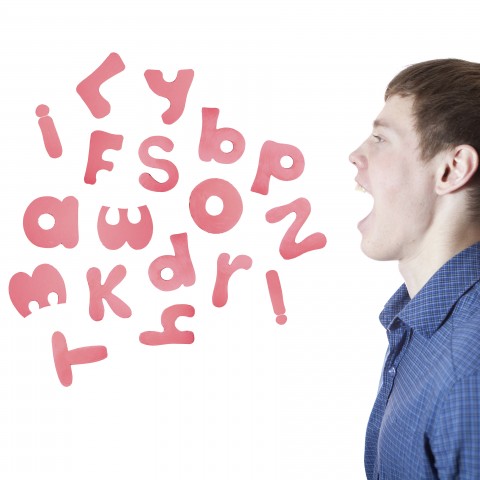
At the intermediate level, you’re able to get creative with the language.
 Table of Contents
Table of Contents
- Once Upon a Time: Talking About Past Events
- You Change Your Mind Like a Girl Changes Clothes: Making and Changing Plans
- Because I Said So: Explaining and Listing Reasons
- The Best Schnitzel I’ve Ever Had: Recommendations and Complaints
- When “Huh” Won’t Do: Reaction Phrases for Everyday Conversations
- Yes, Ma’am: Etiquette Phrases for Social and Business Settings
- How CzechClass101.com Helps You Learn Czech in a Fun Way
1. Once Upon a Time: Talking About Past Events
These are phrases that you would use to tell your friends and coworkers about an interesting event or memorable experience (verbs in the past tense). For all of the examples throughout the article, the verbs are conjugated as masculine/feminine.
- Včera na párty jsme se skvěle bavili.
“We had fun at the party last night.”
- Tuhle práci jsem začal/a dělat před třemi lety.
“I started this job three years ago.”
- To byl nejhorší den mého života.
“That was the worst day of my life.”
- Míval/a jsem štěně jménem Alík.
“I used to have a puppy named Alík.”
- Pivo mi nikdy nechutnalo.
“I’ve never liked beer.”
- Po vysoké jsem rok cestoval/a.
“I traveled for a year after college.”
- Byla to skvělá zkušenost.
“It was a great experience.”
- Hodně mi to dalo.
“It gave me a lot.” (As in: “I learned a lot.”)

Learning a new language will encourage you to live in the moment—because you won’t be able to conjugate any other verb tense for a while.
2. You Change Your Mind Like a Girl Changes Clothes: Making and Changing Plans
A.k.a. explanations, excuses, and polite requests. (Verbs in the future tense.)
You will use these intermediate conversational Czech phrases when making and changing plans in everyday convos and in business settings, in person and through text messages/emails.
- Máš tenhle víkend čas?
“Do you have time this weekend?”
- A co české jídlo?
“How about Czech food?”
- Můžu přivést přítele/přítelkyni?
“Can I bring my boyfriend/girlfriend?”
- Chci se zeptat, jestli to můžeme nechat na jindy.
“I was wondering if we could reschedule.”
- Pojďme se příští úterý sejít na Zoomu a probrat detaily.
“Let’s have a Zoom meeting next Tuesday to discuss the details.”
- Zjistil/a jsem, že se mi to vůbec nehodí, musíme to odložit.
“I found out it’s not a good time for me at all; we need to push it back.”
- Pošli mi ty termíny a domluvíme se po emailu.
“Send me the dates, and we’ll figure it out over email.”
- Bude to muset změnit na poslední chvíli.
“He/she is going to have to make some last-minute changes.”
3. Because I Said So: Explaining and Listing Reasons
Learning these intermediate Czech phrases will help you master the usage of conjunctions, particularly for making explanations.
- Udělal/a jsem to, protože jsem neměl/a jinou možnost.
“I did that because I had no choice.”
- Podle mě je to tak správně. Proto to dělám.
“In my opinion (literally ‘according to me’), it’s the right thing. That’s why I am doing it.”
- Zvolil/a jsem to ze tří důvodů. Zaprvé je to finančně dostupné, za druhé je to jednoduché a v neposlední řadě to skvěle vypadá.
“I chose it for three reasons. First of all, it’s affordable; secondly, it’s simple; and last but not least, it looks amazing.”
- Z toho důvodu už se nespoléhám jen na ni a vždycky mám někoho v záloze.
“For that reason, I don’t rely just on her anymore and always have someone as a backup.”
- Připadalo mi to jako brilantní plán, jenomže zbytek týmu to rezolutně zamítl.
“It seemed like a brilliant plan to me; however, the rest of the team rejected it resolutely.”

I would love to go shopping with you, but I’m busy.
4. The Best Schnitzel I’ve Ever Had: Recommendations and Complaints
Here are some intermediate phrases for Czech conversations that you can use to recommend (or not recommend) something to your friends. These are also useful for writing a review for a product or service.
- Měl/a bys to ochutnat, lepší ___ jsem nikdy neměl/a.
“You should try this. It’s the best ___ I’ve ever had.”
- Pobyt v tomto hotelu jsme si velice užili. Určitě bychom tam bydleli znovu.
“We loved staying at this hotel. I would definitely go back again.”
- Příšerný zákaznický servis. Nedoporučuji.
“Terrible customer service. Would not recommend.”
- Zboží dorazilo pozdě a vypadalo jinak než na fotkách.
“The item arrived late and didn’t look as advertised (as in the pictures).”
- Tristní kvalita, nedostatečná komunikace, neuctivé chování.
“Regrettable quality, insufficient communication, disrespectful behavior.”
- Požádali jsme o vrácení peněz.
“We’ve asked for a refund.”
- Vynikající služby, vstřícný a přátelský personál.
“Superior service, accommodating and professional staff.”
- Rozhodně doporučuji.
“Highly recommend.”

Highly recommend it!
5. When “Huh” Won’t Do: Reaction Phrases for Everyday Conversations
Now let’s add some handy reaction and response phrases to your intermediate Czech vocabulary.
Here’s a little fictional dialogue:
A: Včera jsme se na večírku dobře bavili.
“We had fun at the party last night.”
B: Super! Jsem rád, že jste to stihli.
“Great! I’m glad you made it.”
A: Ale taky to byla nejhorší noc mého života.
“But it was also the worst night of my life.”
B: Děláš si srandu? Proč?
“Are you kidding? Why?”
A: Nedělám. Řekněme, že mi pivo nikdy nechutnalo.
“I’m not. Let’s just say I’ve never liked beer.”
B: Páni! Jsi v pohodě?
“Oh my goodness! Are you okay?”
A: Vlastně je mi skvěle. Byl to fantastický zážitek, hodně mi to dalo. Teď jsem expert na české pivo.
“I feel fantastic, actually. It was a great experience; I learned a lot. Now I’m a Czech beer expert.”
B: To je super, mohlo to dopadnout hůř.
“That’s cool, could have ended up way worse.”
A: Jo. Co tě nezabije, to tě posílí.
“Yeah, what doesn’t kill you makes you stronger.”
6. Yes, Ma’am: Etiquette Phrases for Social and Business Settings
- Dobrou chuť.
“Bon appetit.”
- Vítáme vás/Vítejte v našem obchodě.
“Welcome to our store.”
- Udělejte si pohodlí, prosím.
“Please make yourself at home.”
- V případě dotazů se na mě prosím obraťte.
“Please let me know if you have any questions.”
- Těším se na vaši/tvoji odpověď.
“I look forward to hearing from you.” (plural/singular)
- Šťastnou cestu.
“Have a safe trip!”
- Děkujeme za pozvání.
“Thank you for having us.”
- Přeji vám příjemný pobyt.
“Have a pleasant stay.” / “I wish you a pleasant stay.”

Posaďte se, prosím. – “Have a seat, please.”
7. How CzechClass101.com Helps You Learn Czech in a Fun Way
That’s it, guys! I hope you enjoyed this article and learned something new!
If you’re taking your Czech studies seriously, you might grab a Czech grammar book or learn online (the latter of which is way more convenient). Learning a new skill has never been easier. Just grab your phone and get to work!
CzechClass101.com makes learning Czech easy, exciting, and fun. With us, it’s not about endless memorizing or thick textbooks. Learn Czech the better way—with us, you’ll make progress faster than you could imagine! What can you find here?
- English-to-Czech translation and pronunciation tips/tricks
- Over 630 audio and video lessons
- Vocabulary learning tools
- Spaced repetition flashcards
- Detailed PDF lesson notes
Sign up now—it’s free!
One last thing: Let us know in the comments if this article helped you and if you feel inspired to continue learning Czech now! We love hearing from you.

Czech Podcasts: The Thing You’ll Wish You’d Started Earlier

You’re studying Czech, which means you’ve probably found out that textbooks and grammar tables play a more-or-less secondary role in your path to fluency. Awesome, right? Back in the day, we had to drill and memorize dozens of grammar rules, but those bleak times (before the internet and smartphones) are over! Today, you have numerous learning options for your Czech studies that are much more fun: Czech podcasts, YouTube channels, movies, learning websites…
Language is an organic, living thing, and it’s best to treat it as such. Think of young children. Do they read textbooks and spend hours a day memorizing conjugations? Not really. They play, they shove random objects into their mouths, and they listen. In no time, they’re speaking their mother tongue fluently––without even knowing how to read.
Listening skills and good pronunciation are the key ingredients that you absolutely need if you actually want to speak Czech and interact in the Czech language. How do you acquire them? You guessed it––you need to listen. And that’s where podcasts come into play.
In this article, I’ll list the best Czech podcasts to help you master Czech pronunciation, pick up new words, and learn interesting facts about the language and culture. These podcasts will keep you company while commuting or going for your daily walk (if that’s your thing… I personally know someone who listens to podcasts right before bed, and they claim it helps them remember new words much faster).
Do you have your headphones ready? Let’s dive into it!

With podcasts, you can learn Czech anytime, anywhere!
 Table of Contents
Table of Contents
- The Amazing Benefits of Using Podcasts to Learn Czech
- The Best Podcasts for Learning Czech
- Tips and Tricks for Learning Czech More Effectively with Podcasts
- How CzechClass101.com Helps You Learn Czech in a Fun Way
1. The Amazing Benefits of Using Podcasts to Learn Czech
I remember that back in the 90s, when I was just starting to learn English (I was eight at the time), many people would sigh and say: “Yeah, but you need to LIVE in the country to actually learn to speak the language.”
This was a popular misconception. I still hear it from time to time, and I’ve had a few people ask me: “How long have you lived in the States? Your English is pretty good.”
Well, guess what? I’ve never lived in the States, and you don’t have to move to the Czech Republic to learn Czech.
- ➤ There’s one thing you should do: You need to get comfortable with Czech. Really, really comfortable. The first thing you need to do is find out what it actually sounds like. Trying to learn it without recognizing it first would be like trying to draw a cat if you’d never seen a cat before. Get comfortable with the tune and sounds.
That being said, you need exposure. And in this case, the more, the better.

Choose topics that you actually enjoy–you’ll be more inclined to listen and study more often.
Why should you learn Czech with podcasts every single day?
- It will develop and sharpen your listening skills immensely.
I think you know this, but I’m going to say it anyway: There’s a huge, breathtakingly vast difference between “textbook knowledge” and being able to understand the names of stops on a subway in Prague (for example). Trust me: Your ego will implode if you realize that you’ve spent all these hours studying but still have no idea what your waitress is saying.
- It will improve your pronunciation. (This isn’t just a beginner tip—it still works for me after all these years.)
This is pretty obvious. If you know what a word sounds like—if you hear it—it’s much easier for your tongue, mouth, and throat to make the very same sound. And pronunciation matters. Having a heavy accent makes it difficult for native speakers to understand you, even if your Czech convo partner is trying really hard to meet you halfway.
- It will help you remember phrases, frequently used lines, and chunks of words, which is exactly what you want––learning just words is fine, but you need to know how to use them and where to put them in a sentence. In short: You need context.
I remember how much I struggled with the English present perfect (I have done / you’ve been saying / etc.). I just couldn’t wrap my head around it. There’s no such tense in Czech, and I was frustrated, confused, depressed (okay, I’m being a little dramatic here). Years later, when I was actually exposed to spoken English, I realized how natural, simple, and easy the past perfect is––because I learned when to use it in the most organic way: from and with context.
- Your vocab will boom. You’ll learn the lingo in the best possible way.
Here’s a little real-life story that shows how true this is. I found out what to say when someone thanks you (as in, “you’re welcome”) when I was 25 years old. Up until then, I thought it was prosím (“please”), just like in Czech. Yes, you really needed to know this. You’re welcome. If you choose a topic that you find interesting, I promise that you won’t even know you’re “studying,” and your vocabulary will expand beautifully.
- You will learn new things about Czech culture and other interesting topics.
Pretty self-explanatory, right?

Be active with your passive learning: take notes, write a summary.
2. The Best Podcasts for Learning Czech
Now you know why listening to podcasts in Czech is the best way to get familiar with the language and hone your skills. But which ones are worth your time, and why? Here’s my list of the best Czech podcasts for learners.
Czech with Iva
This fun and authentic podcast in Czech will teach you a lot about everyday life in the Czech Republic––books, food, movies… The speed is more suitable for intermediate Czech learners than for beginners. New episodes are uploaded about every three months or so, and most of them are around 15 minutes long.
CzechClass101
Of course I can’t leave this gem out! The structure of these podcasts is designed by professional teachers—native Czechs who just know how to make things flow. It’s suitable for absolute beginners, intermediate learners, and more advanced students. It’s about all things Czech: culture, practical info, lifestyle…
To make this fun process even more effective, you get access to word lists, slideshows, and flashcards when you create an account on our website.
SBS Czech
Although this podcast has been inactive since 2019, you can still listen to the old episodes. It mostly covers international events and news, and we recommend this one for advanced Czech learners.
Learn Czech
It’s no longer being updated, but the spoken word isn’t perishable, right? This is an excellent tool for beginner Czech learners––you’ll learn the very basic vocabulary and key Czech phrases that you will 100% use in your everyday life.
One Minute Czech
Okay, these episodes are not one minute long, but 3-4 minutes isn’t that long either, is it? Sadly, it’s been inactive too, but you can go ahead and make the most out of the old episodes. It’s a great podcast for absolute beginners, covering the very basics of the Czech language in bite-sized lessons.

3. Tips and Tricks for Learning Czech More Effectively with Podcasts
If you really want to make the most of your time, don’t treat podcasts like white noise.
- Start with podcasts that focus on learning.
Ease into it. You need a slow pace, tips on Czech grammar, and vocab––don’t overwhelm yourself.
- Listen. Focus.
Choose a topic you actually like/need, and don’t think about chores or whatever you need to do next. If you lose focus for a second, you’ll probably get completely lost and will have to start again. Be present.
- Slow it down and pause if needed.
Don’t ignore words that you don’t understand. You know, those that sound like a suppressed burp or weird little chuckle––krk (“neck”) for example, or Praha (“Prague”).
- Write down new phrases and vocabulary.
Have a notebook on hand and write down words you don’t know. You’ll create your own personal dictionary. You’re going to love me for this tip.
- Write a summary of the podcast.
Right after you’re done listening, write down what you remember from the podcast. Let it sit for a few hours, go back to it later, review, practice, and see how much you remember. Try to rephrase it slightly. This is an awesome tip I wish I’d known much earlier.
- Use flashcards.
I personally recommend using smart apps that make your effort much more enjoyable. No need for drudgery, right?
- Repeat words that spiked your interest. In your head and out loud.
Practice makes perfect, and trust me: You need to get used to hearing yourself speaking Czech. You need to figure out how to move your tongue and adjust your breathing. It’s funny at times, and you might feel silly, but this is actually the first step to being able to speak Czech instead of just being able to read it or say random words.

Learn Czech smarter with CzechClass101.
4. How CzechClass101.com Helps You Learn Czech in a Fun Way
That’s it, guys! I hope you enjoyed this article and learned something new! If you’re looking to start learning Czech the smart way or want to sharpen your Czech-language skills, please check out our Basic Bootcamp—the very basic grammar and vocab in five compact lessons.
If you’re taking your Czech studies seriously, you might grab a Czech grammar book or learn online (the latter of which is way more convenient). Seriously: Learning a new skill has never been easier. Just grab your phone and get to work!
CzechClass101.com makes learning Czech easy, exciting, and fun. With us, it’s not about endless memorizing or thick textbooks. Learn Czech the better way—with us, you’ll make progress faster than you could imagine!
What can you find here?
- English-to-Czech translation and pronunciation tips/tricks
- Over 630 audio and video lessons
- Vocabulary learning tools
- Spaced repetition flashcards
- Detailed PDF lesson notes
Sign up now. It’s free!
One last thing: Let us know in the comments if this article helped you and if you feel inspired to start (or continue) learning Czech now! Do you already have a favorite Czech podcast or two? Share them in the comments!

40 Czech Phrases for Beginners You Should Know

Have you ever found yourself in a difficult situation, at a loss for words, helpless…trying desperately to tell the other person that you really, REALLY need a bathroom…in another language?
Learning Czech might take years, but there are certain Czech phrases for beginners you’ll want to memorize right now because they might save your pants one day.
I am being overly dramatic here—for your sake. Czech people (especially old and middle-aged Czechs) simply don’t speak English, and sometimes gestures and body language just won’t do.
I know that some people don’t like memorizing phrases because it feels like it “disrupts” the process of learning. Let me remind you that toddlers don’t give a damn about grammar and vocab—they just learn whatever clusters of words you throw at them without thinking about which gender and case they should use. Do it like them, and you’ll be fine in any situation that might otherwise cause you great anxiety.
In this article, you’ll learn 40 basic Czech phrases for beginners.

Šťastnou cestu! – “Have a happy journey!”
 Table of Contents
Table of Contents
- Don’t be Whatsername: Czech Greetings and Introductions
- Smooth as Butter: Czech Social Phrases
- I’d Like to Buy the Entire Store, Please: Czech Shopping and Restaurant Phrases
- Help, I Need Somebody: Asking for Help in Czech
- How CzechClass101.com Helps You Learn Czech in a Fun Way
1. Don’t be Whatsername: Czech Greetings and Introductions
One word of wisdom from a native: Czechs don’t ask a lot of questions. When my American boyfriend first met my Czech friends and family, he was baffled because “nobody asked me anything.” When I first met his extended family, I was swamped with questions ranging from “What’s your country like?” (innocuous) to “Doesn’t your mom miss you?” (might be considered nosy).
Keeping this little nugget of cultural wisdom in mind, here are a few basic Czech phrases you could use to greet others and make introductions:
| English | Czech |
| Good day. | Dobrý den. – This is a formal greeting that you’ll want to use in official settings, with people older than you, or with people you don’t know. Don’t forget to use the formal voice (i.e., vy – “you” in plural instead of ty – “you” in singular). |
| Hello. | Ahoj. – This is an informal greeting you’ll use with friends, family, children, people you’re on a first-name basis with, etc. It’s possible to use this expression as a greeting and as a goodbye. |
| Hi. | Čau. – This is another casual greeting/goodbye that you’ll use with the informal voice. |
| Good morning. | Dobré ráno. – If you use this greeting later than 10 a.m., people might look at you funny. |
| Good forenoon. | Dobré dopoledne. |
| Good evening. | Dobrý večer. |
| Goodnight. | Dobrou noc. |
| Goodbye. | Na shledanou. |
| Be well. | Mějte se hezky. |
| Take care. | Měj se. – This is an informal version of the phrase above. |
| Nice to meet you. | Těší mě. |
| It was nice to see you. | Rád jsem vás viděl/viděla. |
| I’m pleased to meet you. | Rád tě/vás poznávám. – Informal/formal. |
| How are you? | Jak se máš/máte? – Informal/formal |
| How are you doing? | Jak se ti/vám daří? – Informal/formal |
| Are you doing well? | Máš/máte se dobře? – Informal/formal |
| My name is… | Jmenuju se… |
| I am… | Já jsem… |
| I live in… | Bydlím v… |
| I am from… | Jsem z… |
| I come from… | Pocházím z… |
| Do you know each other? | Znáte se? Vy se znáte? |
| Have you met? | Už jste se seznámili? |
| And you are…? | A vy jste/ty jsi…? |
| I would like you to meet… | Rád bych ti/vám představil/představila… |
| This is… | Tohle je… |
Make sure you check out this article about greetings in Czech and this one on how to introduce yourself in Czech.

Těší mě! – “Nice to meet you!”
2. Smooth as Butter: Czech Social Phrases
Our next set of Czech beginner phrases consists of expressions you’ll need to sound polite in any social context.
| English | Czech |
| Thank you. | Děkuji. Díky. |
| You’re welcome. | Prosím. |
| Don’t mention it. | Za nic. Za málo. – Literally: “for nothing” or “for little” |
| My pleasure. | Rádo se stalo. |
| Please. | Prosím. |
| Could you…? | Mohl/mohla bys? |
| Is it possible to…? | Je možné…? |
| I have a question… | Chci se zeptat… – Literally: “I want to ask…” |
| Can I ask a question? | Můžu se na něco zeptat? – Literally: “Can I ask about something?” |
| Do you have any questions? | Chceš/chcete se na něco zeptat? – Informal/formal – Literally: “Do you want to ask about something?” |
| Do you need anything? | Potřebuješ/potřebujete něco? – Informal/formal |
| Excuse me. | Pardon. (to apologize for interrupting, for example)S dovolením. (when someone’s in your way) |
| I apologize. | Omlouvám se. |
| I’m sorry. | Promiň/promiňte. – Literally: “Forgive me.” – This is the word you would use if you bumped into someone on a crowded train, for example. If you wanted to express sympathy, you would say je mi líto: Je mi líto, kavárna je zavřená. (“I am sorry, the café is closed.”) |
| I didn’t mean to. | Nechtěl/nechtěla jsem. – Literally: “I didn’t want to.” |
| It’s okay. | Nic se neděje. Nic se nestalo. – Literally: “Nothing is happening,” or “Nothing happened.” |
| Forget it. | To nic. – Literally: “It’s nothing.” |
You’ll find more information on how to apologize in Czech in this article.

Můžu se na něco zeptat? – “Can I ask a question?”
3. I’d Like to Buy the Entire Store, Please: Czech Shopping and Restaurant Phrases
You’ll probably encounter many surprising things while shopping and eating out in the Czech Republic:
- We don’t ask for a check; we simply tell the waiter/waitress that zaplatíme (“we’re going to pay”). Period.
- We’re not nearly as generous with tips, and you don’t actually have to tip at all—in a taxi, at hair salons or barbers… If you’re not happy with your food, don’t tip at a restaurant. If you do want to tip, 5-10% would be fine.
- When in a group, you can choose to pay for yourself only. The waitstaff will ask if it’ll be dohromady (“together,” as in “Do you want to pay the total amount?”) or zvlášť (“separately,” as in “Do you want to pay for yourself only?”). If you choose the latter, you’ll just list what you ate and they’ll tell you how much you owe them. Done.
- If you want water with ice, you’ll need to order vodu s ledem (“water with ice”). Plus, you have to pay for it—water in restaurants isn’t free.
- No free refills. It’s not a thing in the Czech Republic.
- The average Czech portion size is about ½ of the average American portion size.
- All prices include tax.
- The staff (and people in general) will likely seem reserved or even unfriendly compared to what you’re used to in the U.S.
| English | Czech |
| I will have… | Dám si… – Literally: “I will give myself…” – When ordering in a restaurant |
| I will take… | Vezmu si… – At a store |
| No, thank you, I’m good. | Ne, děkuju. Nedám si nic. – Literally: “I won’t have nothing.” |
| Can I order? | Můžu si objednat? |
| Would you like to order? | Chcete si objednat? |
| I would like to order. | Chci si objednat. |
| I will pay. | Zaplatím. – This is how you ask for your check in the Czech Republic. |
| We will pay together. | Zaplatíme dohromady. – As in: “We’re not going to split the bill; just tell us the total.” |
| We will pay separately. | Zaplatíme zvlášť. – As in: “Tell me how much for the things I had.” |
| I will pay with a card. | Zaplatím kartou. |
| I will pay in cash. | Zaplatím hotově. |
| Can I pay with a card? | Můžu platit kartou? |
| Can I pay in cash? | Můžu platit hotově? |
| Do you have…? | Máte…? |
| How much is this? | Kolik to stojí? – Literally: “How much does it cost?” |
| What will you have? | Co si dáš/dáte? |
| I like it. | Líbí se mi to. |
| I don’t like it. | Nelíbí se mi to. |
| Do you like it? | Chutná ti/vám? – Literally: “Does it taste to you?” – When asking about food |
| I like it. | Chutná mi to. – Literally: “It tastes to me.” |
| I don’t like it. | Nechutná mi to. – Literally: “It doesn’t taste to me.” |
| The food is delicious. | To jídlo je výborné. |
| It’s gross. | Je to hnusné. |
| I think the food has gone bad. | Myslím, že je to jídlo zkažené. |
| Would you like anything? | Dáš/dáte si něco? – Informal/formal – Literally: “Will you have anything?” |
| Can I invite you for dinner? | Můžu tě/vás pozvat na večeři? – Informal/formal |
| Do you want to go someplace? | Zajdeme někam? – As in: “Do you want to go grab a bite or coffee?” |
| Will you have lunch with me? | Půjdeš se mnou na oběd? – Literally: “Will you go to lunch with me?” |
| I want to check in. | Chci se ubytovat. |
| I want to check out. | Chci se odhlásit. |
| I have a reservation/booking. | Mám rezervaci. – You would use this phrase at a restaurant or in a hotel. |
| I am allergic to… | Mám alergii na… |
CzechClass101.com has lessons covering useful Czech words and phrases related to dining and shopping, each with pronunciation examples to make your learning process even smoother.

Na zdraví! – “Cheers!”
4. Help, I Need Somebody: Asking for Help in Czech
I genuinely hope you’ll never need any of these. (Well, I already know you will. Everybody needs the restroom, even while traveling, right?)
Anyway, please be safe, make sure you keep your passport in a convenient place, write down your embassy and emergency phone numbers, and don’t walk around shady neighborhoods alone.
Unlike in the U.S., the Czech police, firemen, and paramedics have different phone numbers. Make sure you know them.
| English | Czech |
| Where is…? | Kde je…? |
| How will I get to the station/airport? | Jak se dostanu na nádraží/letiště? |
| Do you speak English? | Mluvíte anglicky? |
| I don’t speak Czech. | Nemluvím česky. |
| I don’t understand. | Nerozumím. |
| Could you say it again? | Můžete to zopakovat? |
| I need help. | Potřebuju pomoc. |
| Help! | Pomoc! |
| I need a doctor. | Potřebuju doktora. |
| I need to call… | Potřebuju zavolat… |
| I need to call an ambulance. | Potřebuju zavolat pohotovost. |
| Please call an ambulance. | Zavolejte pohotovost prosím. |
| I don’t feel well. | Není mi dobře. |
| I am hurt/injured. | Jsem zraněný/zraněná. |
| Call the police. | Zavolejte policii. |
| Call the firefighters. | Zavolejte hasiče. |
| There’s a fire. | Hoří. – Literally: “burning,” as in “It’s burning.” |
| I need to call the embassy. | Potřebuju zavolat na ambasádu. |
| Where’s the restroom? | Kde jsou záchody/toalety? – Toalety is a fancier, more polite word. |
| I lost… | Ztratil/ztratila jsem… |
| I need… | Potřebuju… |
| I don’t know. | Nevím. |
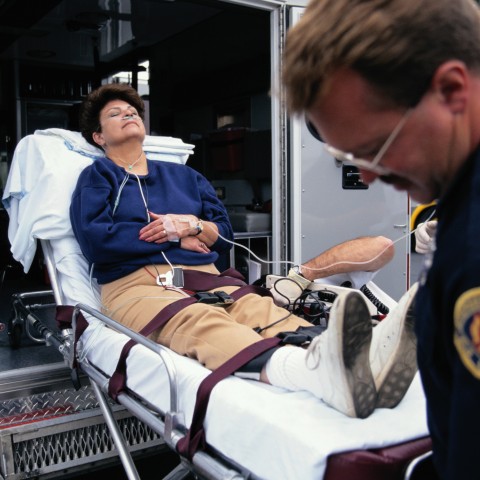
Pohotovost – “Ambulance”
5. How CzechClass101.com Helps You Learn Czech in a Fun Way
That’s it, guys! I hope you enjoyed this article and learned something new! In case our list of the most common Czech words and phrases for beginners wasn’t long enough for you, please check out our Basic Bootcamp—the very basic grammar and vocab in five compact lessons.
If you’re taking your Czech studies seriously, you could grab a Czech grammar book or learn online (the latter of which is way more convenient). Seriously, learning a new skill has never been easier. Just grab your phone and get to work!
CzechClass101.com makes learning Czech easy, exciting, and fun. With us, it’s not about endless memorizing or thick textbooks. Learn Czech the better way—with us, you’ll make progress faster than you could imagine!
What can you find here?
- English-to-Czech translation and pronunciation tips
- Over 630 audio and video lessons
- Vocabulary learning tools
- Spaced repetition flashcards
- Detailed PDF lesson notes
Sign up now. It’s free!
One last thing: Let us know in the comments if this article helped you. Are there any particular beginner phrases you’d like to learn the Czech translations for? Let us know in the comments!

Advanced Czech Words

Congratulations! You’ve worked your way up to an advanced level of the beautiful Czech language.
You’ve mastered the past, present, and future tenses. You can have a pretty comprehensive conversation about almost anything and write long paragraphs. You can probably watch some movies and TV shows in Czech, and talk about various topics without getting sweaty. Your level is somewhere around B1, and your vocabulary comes up to a whopping 2500 words or so.
In this article, you’ll expand your vocab even more with advanced Czech words. Beware though. It is very easy (and common) to get complacent, think you’ve “seen it all,” and stop working on your skills. I am a living example of how fast laziness can throw you back to “square intermediate,” a.k.a. using 1000 words over and over again. Please, don’t be like me. Maintenance is hard, but it pays off––this is just as true for gaining knowledge as it is for losing weight or any other difficult task. Five to fifteen minutes a day is enough, and you’ll be amazed by the results. (Have you seen our awesome Vocab Builder?)
Now, buckle up and get ready to learn over 200 advanced Czech words.

“What’s the best synonym for…?”
 Table of Contents
Table of Contents
- Let’s Get Scholastic: Advanced Czech Academic Vocabulary
- You Better Mean Business: Advanced Czech Business Vocabulary
- When “Are You OK?” Isn’t Enough: Advanced Czech Medical Vocabulary
- When Your Lawyer isn’t Picking Up: Advanced Czech Legal Vocabulary
- When You Want to Sound Creative: Advanced Czech Synonyms
- How CzechClass101.com Helps You Learn Czech in a Fun Way
1. Let’s Get Scholastic: Advanced Czech Academic Vocabulary
The first set of advanced Czech vocabulary we’ll cover comprises words you would hear or use in academic settings. These words will help you out if you plan to study in the Czech Republic, and they’ll give your conversations a sophisticated edge.
| Czech | English | Part of Speech | Example |
| hodnocení | evaluation | noun | To nebude předmětem finančního hodnocení.“ That won’t be a subject of financial evaluation.” |
| kontroverzní | controversial | adjective | Je to kontroverzní téma. “That’s a controversial topic.” |
| ambivalentní | ambivalent | adjective | Jejich názory jsou dost ambivalentní. “Their opinions are quite ambivalent.” |
| obskurní | obscure | adjective | Ten horor byl obskurní a děsivý. “The horror movie was obscure and creepy.” |
| poučný | instructive/informative | adjective | Jeho přednáška byla velmi poučná. “His talk was very informative.” |
| zkoumat | to study/to examine | verb | Vědci zkoumají vedlejší účinky vakcíny. “Scientists are examining side effects of the vaccine.” |
| dodržet | to adhere/to comply with | verb | Nedodržel své závazky. “He didn’t comply with his obligations.” |
| objevit | to discover | verb | Objevil temnou stránku svého daru. “He discovered the dark side of his gift.” |
| dospět ke stanovisku | to conclude/to come to an opinion | verb | Parlament má dostatek času dospět k nějakému stanovisku. “Parliament has enough time to come to an opinion.” |
| posoudit | to consider | verb | To je něco, co musíme v budoucnu posoudit. “That is something that we need to consider in the future.” |
| vyhodnotit | to deduce | verb | Snažím se vyhodnotit funkčnost. “I’m trying to deduce the functionality.” |
| optimální | optimal | adjective | Umožňuje optimální podmínky bezpečnosti. “It allows optimal safety conditions.” |
| ohledně | regarding | adverb | Kontaktuji vás ohledně vaší dcery. “I am getting in touch regarding your daughter.” |
| provést | to carry out | verb | Provedli operaci. “They carried out a surgery.” |
| odhad | estimate | noun | Jeho odhad ceny byl správný. “His price estimate was correct.” |
| názor | opinion | noun | Má divné názory. “She has strange views.” |
| výsledek | result | noun | Výsledek testu najdete online. “The test result can be found online.” |
| následek | consequence | noun | Následky si ponese sám. “He will have to deal with the consequences himself.” |
| důsledek | consequence | noun | Většina lidí takové důsledky neunese. “Most people can’t bear such consequences.” |
| studie | study | noun | Podle nejnovější studie jablka nejsou zdravá. “According to the latest study, apples aren’t healthy.” |
| výzkum | research | noun | Kdy konečně dokončí výzkum? “When will he finally wrap up his research?” |
| závěr | conclusion | noun | Jak jsi k tomu závěru dospěl? “How did you come to that conclusion?” |
| abstrakt | abstract | noun | Měl moc dobře napsaný abstrakt. “His abstract was very well written.” |
| anotace | annotation | noun | Potřeboval popis systému anotace stran. “He needed a description of the system for the annotation of pages.” |
| vyplývat | to arise | verb | Pro naši skupinu z toho nemůže vyplývat dodatečné zvýhodnění. “It’s not permissible for a supplementary advantage to arise for our group.” |
| obecně řečeno | generally speaking | adverb | Obecně řečeno, ženy mají menší nohy. “Generally speaking, women have smaller feet.” |
| hierarchie | hierarchy | noun | Hierarchie zjišťování reálné hodnoty “Fair value hierarchy of assets” |
| pobyt | residency | noun | Má tu trvalý pobyt. “He has residency here.” / “He’s a resident here.” |

Jsem kontroverzní osobnost, všichni o mně šíří drby. – “I am a controversial person; everyone is gossiping about me.”
2. You Better Mean Business: Advanced Czech Business Vocabulary
If you’re planning to work in the Czech Republic or if you have business matters to attend to here, it’s crucial to learn advanced Czech terms related to business. You’ll find the basics here, but you can head over to our business phrases article or this vocab list to pick up even more essential vocabulary.
| Czech | English | Part of Speech | Example |
| organizovat | organize | verb | Organizovala mu život, jako by byl její dítě. “She organized his life as if he were her child.” |
| fiskální | fiscal | adjective | Mají podivné fiskální zásady. “Their fiscal principles are strange.” |
| strategie | strategy | noun | Má skvělou strategii prodeje. “He has an awesome sales strategy.” |
| rozšířit | to expand | verb | Rozšířili si povědomí. “They expanded their consciousness.” |
| klauzule | clause/article | noun | Je to popsané v první klauzuli. “It’s described in the first article.” |
| neplatný | null and void | adjective | Ta smlouva je od začátku neplatná, protože obžalovaný neměl povolení ji podepsat jejím jménem. “The agreement is null and void because the defendant wasn’t authorized to sign it on her behalf.” |
| uzávěrka | deadline | noun | Tenhle týden mám dvě uzávěrky. “I have two deadlines this week.” |
| konkurent | competitor | noun | Je to pěkně tvrdý konkurent. “He is a tough competitor.” |
| faktura | invoice | noun | Jdu jim poslat novou fakturu. “I’m going to send them a new invoice.” |
| záloha | advance/deposit | noun | Požádali nás o zálohu. “They asked us for a deposit.” |
| výplata | payout | noun | Výplata jeho dědictví proběhla včera. “The payout of his inheritance was carried out yesterday.” |
| odepsat | to write off | verb | Koupím si telefon a odepíšu ho z daní. “I’ll buy a phone and write it off.” |
| ochranná známka | trademark | noun | Na fotce je ochranná známka společnosti. “There’s the company’s trademark in the picture.” |
| shoda | compliance | noun | Shoda s těmito požadavky je nezbytná. “Compliance with these requirements is necessary.” |
| vztahy s veřejností/PR | Public Relations | noun | Vztahy s veřejností řídí jeho žena. “His wife manages his PR.” |
| program/plán | schedule | noun | Máme nabitý program. “Our schedule is jammed.” |
| vizuály | visuals | noun | Podle vizuálů jsme vybrali nový projekt. “We picked a new project based on visuals.” |
| pobočka | branch | noun | Otevíráme další pobočku. “We’re opening another branch.” |
| franšíza | franchise | noun | Ta franšíza je pro podnik důležitá. “The franchise is very important for the company.” |
| povolení | authorization | noun | Raději byste měl mít oficiální povolení pro zatčení. “You better have official authorization to make an arrest.” |
| dress code | dress code | noun | Máte v práci dress code? “Do you have a dress code at work?” |
| záruka | warranty | noun | Na počítač se vztahuje záruka. “There is a warranty on the computer.” |
| pověřený/autorizovaný | authorized | adjective | Kdo je pověřenou osobou? “Who is the authorized personnel?” |
| pokuta | fine | noun | Dostal pokutu. “He got a fine.” |
| penále | penalty | noun | Zaplatí vysoké penále. “They are going to pay a huge penalty.” |
| propagace | promotion | noun | Propagace toho produktu selhala. “The promotion of the product failed.” |
| dohoda/smlouva | agreement | noun | Podepíšeme smlouvu. “We’ll sign an agreement.” |
| smlouva o mlčenlivosti | NDA | noun | Podepsal smlouvu o mlčenlivosti, aby tam mohl pracovat. “He signed an NDA in order to work there.” |
| nabídka | offer | noun | To je lákavá pracovní nabídka. “It is a great job offer.” |
| poptávka | demand | noun | Poptávku určuje vkus zákazníka. “Demand is determined by the customer’s taste.” |
| protinabídka | counteroffer | noun | Jejich protinabídka byla nízká. “Their counteroffer was too low.” |

Podepíšeme smlouvu. – “We will sign an agreement.”
3. When “Are You OK?” Isn’t Enough: Advanced Czech Medical Vocabulary
Getting ready to study medicine or land a job in the medical field? Maybe you’re not so lucky, and you’re sitting in the ER waiting for a doctor. Whatever the case, these advanced Czech words will help you out in a pinch.
| Czech | English | Part of Speech | Example |
| biopsie | biopsy | noun | Výsledky biopsie byly abnormální. “The biopsy results were abnormal.” |
| demence | dementia | noun | Jeho babička trpí demencí. “His grandma has dementia.” |
| abnormální | abnormal | adjective | Jeho symptomy byly abnormální. “His symptoms were abnormal.” |
| akutní | acute | adjective | Má akutní zánět. “He has an acute infection.” |
| chronický | chronic | adjective | Jeho onemocnění je chronické. “His condition is chronic.” |
| vzorek moči | urine sample | noun | Požádali pacienta o vzorek moči. “They asked the patient for a urine sample.” |
| vyšetření | test | noun | Lékař provedl pár vyšetření. “The doctor ran a few tests.” |
| zdravotní prohlídka | medical examination | compound noun | Objednal se na prohlídku. “He made a medical examination appointment.” |
| být v bezvědomí | to be unconscious | verb | Po pádu byla v bezvědomí. “She was unconscious after the fall.” |
| stabilní | stable | adjective | Jeho stav je stabilní. “He is stable.” |
| ztráta paměti/amnézie | amnesia | noun | Po nehodě trpí amnézií. “She suffers from amnesia after the accident.” |
| amputace | amputation | noun | Amputace jeho nohy byla nevyhnutelná. “It was necessary to amputate his leg.” |
| anémie/chudokrevnost | anemia | noun | Chudé děti trpěly anémií. “Poor children suffer from anemia.” |
| artritida/revma | arthritis | noun | Rakovina tě může zabít, ale když se podíváte na čísla, artritida ničí více životů. “Cancer may kill you, but when you look at the numbers, arthritis ruins more lives.” |
| ultrazvuk | ultrasound | noun | Můžeš naplánovat další ultrazvuk na příští týden? “Can you schedule another ultrasound for next week?” |
| astma | asthma | noun | Nekouří, má astma. “He doesn’t smoke; he has asthma.” |
| pupeční šňůra | umbilical cord | compound noun | Tatínek přestřihl pupeční šňůru. “The daddy cut the umbilical cord.” |
| bakterie | bacteria | noun | Akné způsobují bakterie. “Acne is caused by bacteria.” |
| maligní | malignant | adjective | Jeho nádor byl maligní. “His tumor was malignant.” |
| benigní | benign | adjective | Její nádor byl benigní. “Her tumor was benign.” |
| proleženina | bedsore | noun | Podložky předchází tvorbě proleženin. “Pads prevent the formation of bedsores.” |
| rentgen | x-ray | noun | Provedli rentgen plic. “They did a chest x-ray.” |
| invalidní vozík | wheelchair | noun | Nemůže chodit, je na vozíku. “He can’t walk; he’s in a wheelchair.” |
| oddělení | ward | noun | Na kterém leží oddělení? “Which ward is he in?” |
| návštěvní doba | visiting hours | compound noun | Kdy jsou v nemocnici návštěvní hodiny? “What are the visiting hours at the hospital?” |
| specialista/odborný lékař | specialist | noun | Je specialista na ORL. “He is an ENT specialist.” |
| záchvat | seizure | noun | Má epilepsii, často mívá záchvaty. “He has epilepsy; he often has seizures.” |
| JIP, Jednotka intenzivní péče | ICU | compound noun | Její stav se zhoršil, je na JIP. “Her condition worsened; she’s in an ICU.” |
| rána | wound | noun | Uhodila ho lahví, rána hodně krvácela. “She hit him with a bottle; the wound bled badly.” |
| řez | incision | noun | Po řezu použijeme rozpínač tkáně. “After the incision, we use a tissue expander.” |
| vedlejší účinek | side effect | compound noun | Vakcína má minimální vedlejší účinky. “The vaccine has minimal side effects.” |
Don’t forget to memorize a few essential phrases in case you ever need medical assistance in the Czech Republic. Knowing what some of the most common conditions are called in Czech won’t hurt either.

Jaké máte příznaky? – “What are your symptoms?”
4. When Your Lawyer isn’t Picking Up: Advanced Czech Legal Vocabulary
| Czech | English | Part of Speech | Example |
| odvolání | appeal | noun | Stanoví se vhodné postupy odvolání proti rozhodnutím. “Appropriate appeals procedures against decisions shall be provided for.” |
| zatčení | arrest | noun | Po přiznání následovalo zatčení. “The confession was followed by arrest.” |
| právník | lawyer | noun | Právník – advokát, státní zástupce nebo obhájce – je profesionál, který radí a zastupuje druhé v právních záležitostech. “A lawyer—attorney, prosecutor, or counselor—is a licensed professional who advises and represents others in legal matters.” |
| advokát | attorney | noun | |
| státní zástupce | prosecutor | noun | |
| odpovědný | liable | adjective | Člověk odpovědný za škodu vstal a vyslechl verdikt. “The person liable for the damage stood up and heard the verdict.” |
| verdikt | verdict | noun | |
| zatykač | warrant | noun | Vydáme zatykač na oba zloděje. “We will issue a warrant for both of the thieves.” |
| svědek | witness | noun | Stala se korunním svědkem v případu vraždy a nejspíš něco ví i o tom únosu. “She became a material witness in the murder case, and she probably knows something about the kidnapping too.” |
| únos | kidnapping | noun | |
| padělání | forgery | noun | Byl obviněn z finančního podvodu a taky mu hrozí dva roky za padělání peněz. “He was convicted of fraud, plus he’s facing a two-year sentence for money forgery.” |
| podvod | fraud | noun | |
| nedbalost | negligence | noun | Jeho nedbalost ho přivedla k bankrotu. “His negligence led to bankruptcy.” |
| křivá přísaha | perjury | compound noun | Křivá přísaha je trestný čin. “Perjury is a criminal offense.” |
| krádež v obchodě | shoplifting | noun | Majitel obchodu ji obvinil z krádeže. “The owner of the store accused her of shoplifting.” |
| vandalismus | vandalism | noun | Byl zatčen za vloupání, rabování a vandalismus. “He was arrested for breaking and entering, burglary, and vandalism.” |
| vstup bez povolení | trespassing | noun | Vstup bez povolení znamená vstup na cizí pozemek bez svolení majitele. “To trespass means to enter someone’s property without the owner’s permission.” |
| advokát | advocate | noun | Tvůj advokát za tebe bude mluvit a reprezentovat tvé stanovisko, když to nezvládneš sám. “Your advocate can speak for you and represent your views when you are unable to do so by yourself.” |
| pokuta | fine | noun | Strážník vypsal pokutu za překročení rychlosti. “The officer issued a fine for breaking the speed limit.” |
| obvinit | to accuse | verb | Manželka toho nevěrníka ho obvinila ze lži. “The cheater’s wife accused him of lying.” |
| nelegální | illegal | adjective | Každý zločin je nelegální. “Every crime is illegal.” |
| vinný | guilty | adjective | Přiznal, že je vinný a omluvil se. “He pleaded guilty and apologized.” |
| doznání viny | confession/plead guilty | compound noun | Pachatel doznal vinu. “The perpetrator confessed.” |
| nevinný | innocent | adjective | Právník prokázal, že byl obžalovaný nevinný. “The lawyer proved that the defendant was innocent.” |
| obžalovaný | defendant | noun | |
| přestupek | misdemeanor | noun | Přestupek je zločin, který je obvykle trestán drobnou pokutou. “Misdemeanor is a crime usually punishable upon conviction by a small fine.” |
| podmínka | parole | noun | Ten zločinec je v podmínce. “The criminal is on parole.” |
| přísaha | plea | noun | Jeho právník vznáší námitku nepřípustnosti. “His attorney raises a plea of inadmissibility.” |
| žalobce/prokurátor | prosecutor | noun | Předvolání je úřední žádost vydaná obvykle na žádost federálního prokurátora. “A subpoena is an official request usually issued at the request of a prosecutor.” |
| předvolání/obsílka | subpoena | noun | |
| soudní síň | courtroom | noun | Soudní síň je místo, kde soudce předsedá slyšením a přelíčením. “A courtroom is where a judge presides over hearings and trials.” |
| soudce | judge | noun | |
| žalovat | to sue | verb | Žalovala ho za porušení jejich smlouvy. “She sued him for breaching their agreement.” |
| svědčit | to testify | verb | Měla proti němu vypovídat, ale změnila své svědectví. “She was supposed to testify against him, but she changed her testimony.” |
| výpověď/svědectví | testimony | noun | |
| trestní právo | criminal law | compound noun | Trest smrti je v souladu s trestním právem této země zrušen. “The capital punishment is abolished according to the criminal law in this country.” |
| trest smrti | capital punishment | compound noun | |
| obvinění | charge | noun | Ukradl jim auto a obvinili ho. “He stole their car, and they pressed charges.” |
| Civilní ztráty | collateral damage | compound noun | Zbývající oběti jsou v této kauze civilními ztrátami. “In this case, the remaining victims are collateral damage.” |
| kauza | case | noun | |
| oběť | victim | noun | |
| občanské právo | civil law | compound noun | Občanské právo není trestní právo. “Civil law is a non-criminal law.” |
| usvědčení | conviction | noun | Počet trestních stíhání a usvědčení je nízký. “The level of prosecutions and convictions is low.” |
| kauce | bail | noun | Zadržené osoby budou vyslyšeny bez práva na kauci nebo bez potřeby důkazů. “Persons apprehended shall be given a hearing without right of bail, without the necessity of evidence.” |
| důkazy | evidence | noun | |
| obhájce | barrister | noun | Obhájce jedná za obhajobu nebo na trestní stíhání. “A barrister is acting for the defense or the prosecution.” |
| nájem | rent | noun | Nechci platit hypotéku a půjčku, nájem je levnější. “I don’t want to pay a mortgage and loans; rent is cheaper.” |
| hypotéka | mortgage | noun | |
| půjčka | loan | noun | |
| pronajímatel | landlord | noun | Pronajímatel a nájemník podepsali nájemní smlouvu. “The landlord and tenant signed a lease.” |
| nájemník | tenant/proprietor | noun | |
| nájemní smlouva | rental agreement/lease | compound noun |

Proces byl zahájen. – “The trial has begun.”
You’ll find the essential legal terms here.
5. When You Want to Sound Creative: Advanced Czech Synonyms
Here are some advanced Czech words you can use as alternatives to their weaker counterparts. You’re welcome!
| Czech | English | Part of Speech | Example |
| enormní | enormous | adjective | Měl o ni enormní zájem. “His interest in her was enormous.” |
| tedy | therefore | adverb | Manželství je tedy rozvedeno. “Therefore, the marriage is terminated.” |
| v podstatě | in essence | adverb | V podstatě je to samotář. “He is in essence a very solitary person.” |
| lze | may be/can be | adverb | Lze říci… “It can be concluded that…” |
| poněkud | somewhat | adverb | Možná to působí poněkud vágně. “It may appear to be somewhat vague.” |
| vágně | vague | adverb | |
| skrovně | scantily | adverb | Byla skrovně oděná a její styl byl ordinérní. “She was scantily clad and her style was vulgar.” |
| nevalný | poor | adjective | Ona má nevalný vkus na muže, všichni její chlapci byli zlodějíčci, kteří chodili domů jen zřídka. “She has a poor taste in men; all her boyfriends were infamous little thieves who rarely ever showed up at home.” |
| nechvalný | infamous | adjective | |
| zřídka | rarely | adverb | |
| nepatrně | slightly | adverb | Jeho zdraví se nepatrně zlepšilo. “His health slightly improved.” |
| částečně | partially | adverb | Částečně s tím plánem souhlasím, ale příliš vysoké náklady mě znepokojují. “I partially agree with the schedule, but I find the too high expenses considerably alarming.” |
| značně | considerably | adverb | |
| příliš | too | adverb | |
| náhle | suddenly | adverb | Náhle prodal bezmála všechen majetek a pozvolna snížil svůj příjem. “Suddenly, he sold nearly all of his belongings, and he gradually decreased his income.” |
| bezmála | nearly | adverb | |
| pozvolna | gradually | adverb | |
| téměř | almost | adverb | Navzdory obavám zvýšil prodej a zanedlouho vydělával téměř třikrát tolik co loni. “Despite his fear, he increased his sales, and before long, he was making almost triple as much as last year.” |
| zanedlouho | before long | adverb | |
| navzdory | despite | adverb | |
| záhy | soon/shortly | adverb | |
| neprodleně | without delay | adverb | Neprodleně zaplatil všechny dluhy. “He paid off all of his debt without delay.” |
| nicméně | nonetheless | adverb | Zbohatl, nicméně štěstí mu to nepřineslo. “He got rich; nonetheless, it didn’t make him any happier.” |
| z toho důvodu | for this reason | adverb | Nechápala ho a z toho důvodu se rozhodla odejít. “She didn’t understand him, and she left for this reason.” |
| neboť | for/because | adverb | Tvoje sklenice nebude nikdy prázdná, neboť já budu tvým vínem. “Your cup will never be empty, for I will be your wine.” |
| opět | once again | adverb | Opět ji překvapil květinami. “He surprised her with flowers once again.” |
| přesto | nevertheless | adverb | Jeho četné avantýry ji mrzely, přesto ho milovala. “His frequent affairs were upsetting her; she loved him nevertheless.” |
| četný | frequent | adjective | |
| početný | numerous/large | adjective | Měli početnou rodinu. “They had a large family.” |
| mohutný | massive/mighty | adjective | Překvapila je mohutná vlna odporu. “They were surprised by a massive wave of resistance.” |
| rozsáhlý | vast | adjective | Vlastní rozlehlý pozemek a ohromný dům. “He owns a vast property and an immense mansion.” |
| rozlehlý | wide/vast | adjective | |
| ohromný | immense | adjective | |
| velkorysý | munificent | adjective | Je zámožný a výjimečně velkorysý. “He is wealthy and exceptionally munificent.” |
| zámožný | wealthy/prosperous | adjective | |
| závažný | severe/major | adjective | Důsledkem jejich opulentních večírků byly závažné finanční potíže. “The consequence of their opulent parties were major financial problems.” |
| opulentní | opulent | adjective | |
| značný | substantial | adjective | Jako politik má značný vliv na správu financí. “As a politician, he has a substantial influence on the finance management.” |
| signifikantní | significant | adjective | Počet nakažených byl signifikantní. “The number of infected people was significant.” |
| intenzivní | intense | adjective | Láska je intenzivní pocit. “Love is an intense feeling.” |
| charakteristický | characteristic/distinctive/signature | adjective | Co je tvoje charakteristická vlastnost? “What’s your distinctive trait?” |
| vedlejší | minor/subsidiary | adjective | Její starosti jsou pro nás vedlejší. “Her worries are of a minor nature for us.” |
| extenzivní | extensive | adjective | Provedl extenzivní výzkum. “He conducted extensive research.” |
| usilovný | strenuous/earnest | adjective | Jeho usilovná snaha ji obtěžovala. “His earnest effort annoyed her.” |
| pronikavý | penetrating/piercing/pungent | adjective | Ona má velmi pronikavé oči. “She has very piercing eyes.” |
| zanedbatelný | negligible | adjective | Riziko nákazy je zanedbatelné. “The risk of infection is negligible.” |
| triviální | trivial | adjective | Je nudný, mluví jen o triviálních hloupostech. “He’s boring; he talks about trivial nonsense.” |
| banální | banal/trite | adjective | Je to banální, ale taky mě to dojímá. “It’s trite but I find it touching, too.” |
| ordinérní | obvious/vulgar | adjective | Má laciný a ordinérní vkus. “He has an ordinary and cheap style.” |
| fádní | insipid | adjective | Ta barva je tak fádní, nenávidím zelené šaty. “That color is so insipid; I hate green dresses.” |
| vydatný | hearty/square | adjective | Měla jsem vydatnou snídani. “I had a hearty breakfast.” |
| nepatrný | minuscule | adjective | Je to nepatrná chyba. “It is a minuscule error.” |
| irelevantní | irrelevant | adjective | Jeho stupidní poznámka je irelevantní. “His stupid comment is irrelevant.” |
| okrajový | marginal | adjective | Efekt tohoto výběru je pouze okrajový. “The effect of this selection is only marginal.” |
| převratný | groundbreaking | adjective | Dostal převratný nápad. “He had a groundbreaking idea.” |
6. How CzechClass101.com Helps You Learn Czech in a Fun Way
Stop trying to learn Czech. Learn Czech. Get smarter tools, study smarter, and believe in yourself. The sky’s the limit!
I hope you enjoyed this article and learned something new! In case this wasn’t enough for you, please check out our Basic Bootcamp—the very basic grammar and vocab in five compact lessons.
If you’re taking your Czech studies seriously, you might grab a Czech grammar book or learn online (the latter of which is way more convenient). Learning a new skill has never been easier. Just grab your phone and get to work!
CzechClass101.com will make learning Czech easy, exciting, and fun. With us, it’s not about endless memorizing or thick textbooks. Learn Czech the better way—with us, you’ll make progress faster than you could imagine!
What can you find here?
- English-to-Czech translation and pronunciation tips
- Over 630 audio and video lessons
- Vocabulary learning tools
- Spaced repetition flashcards
- Detailed PDF lesson notes
Sign up now. It’s free!










